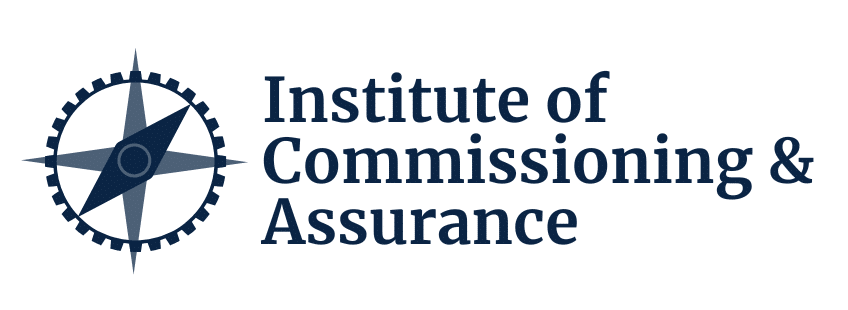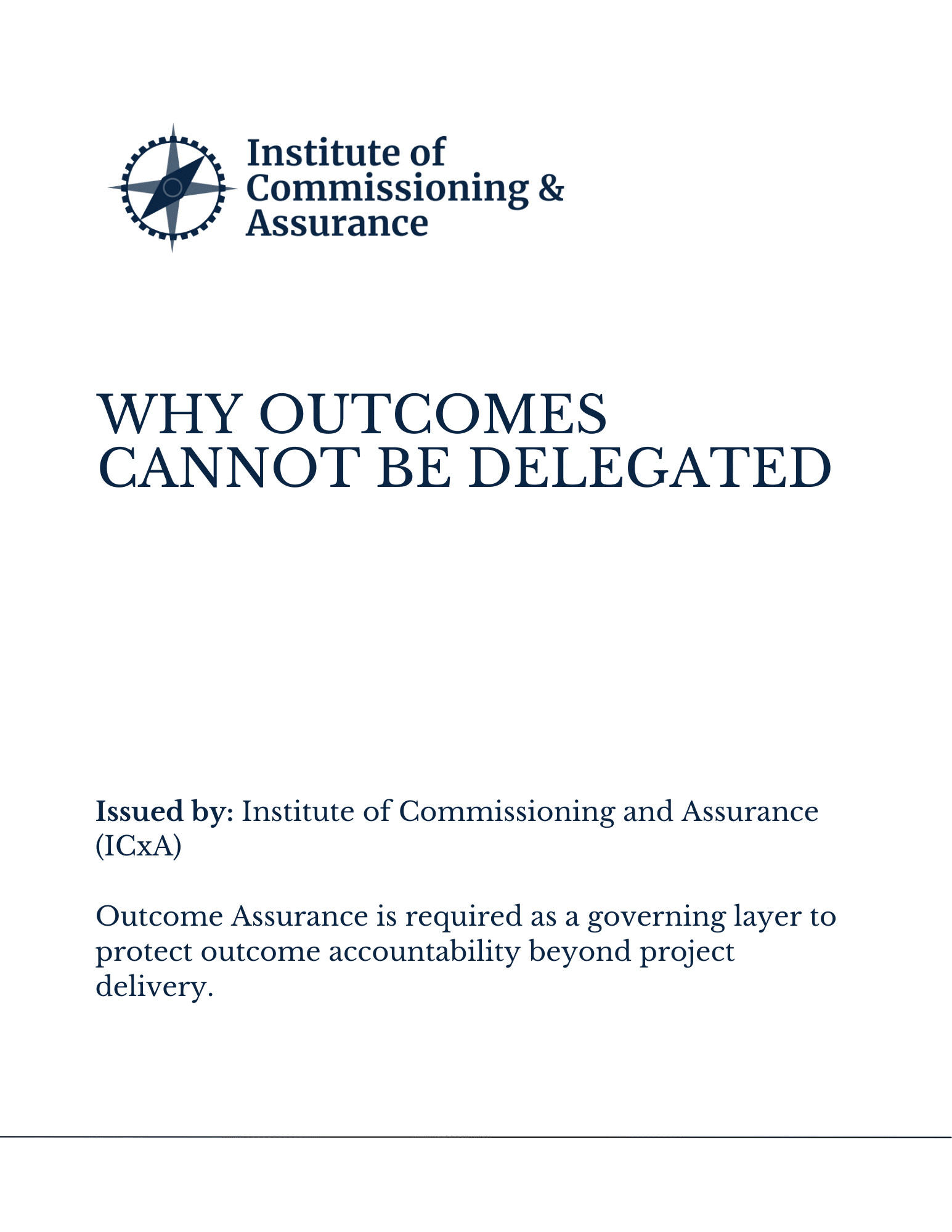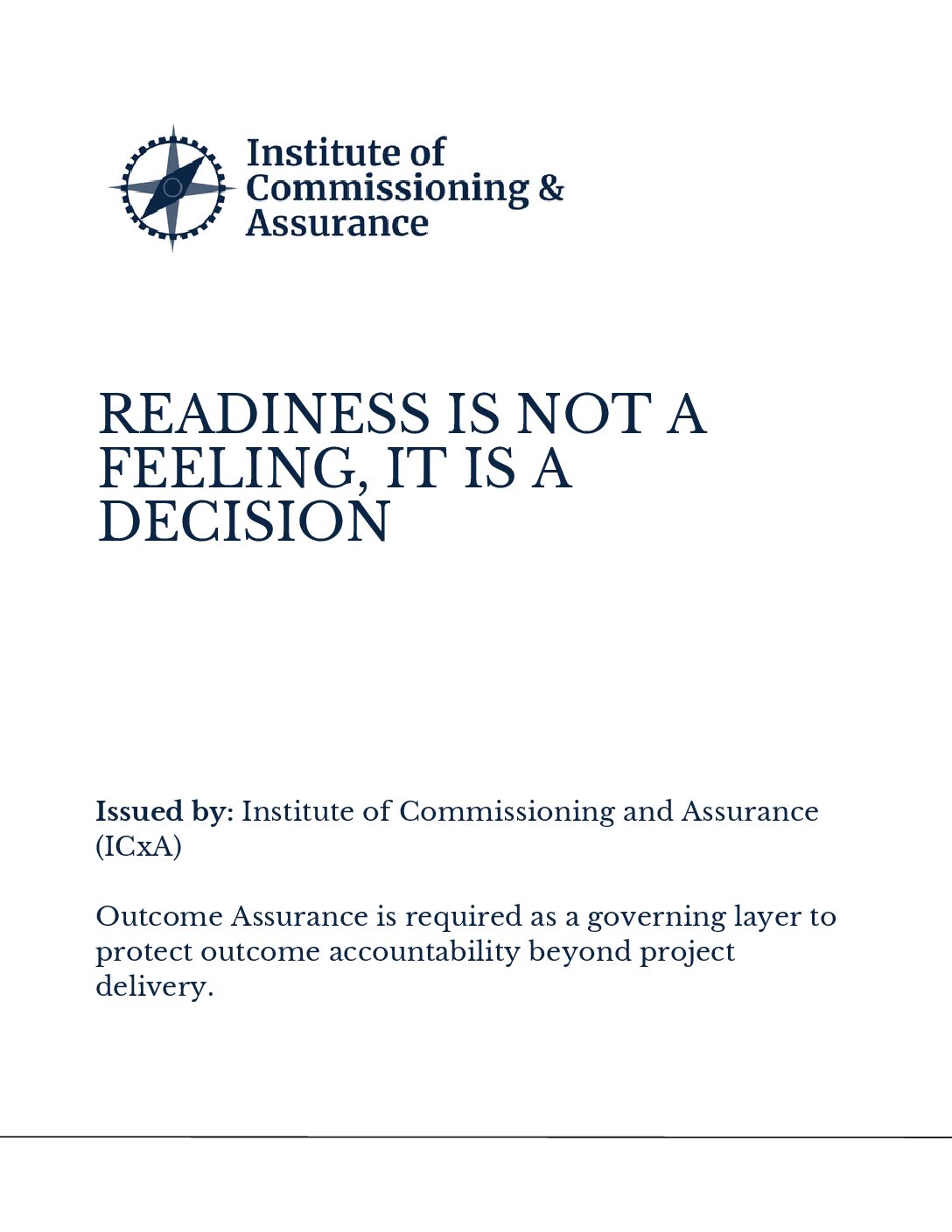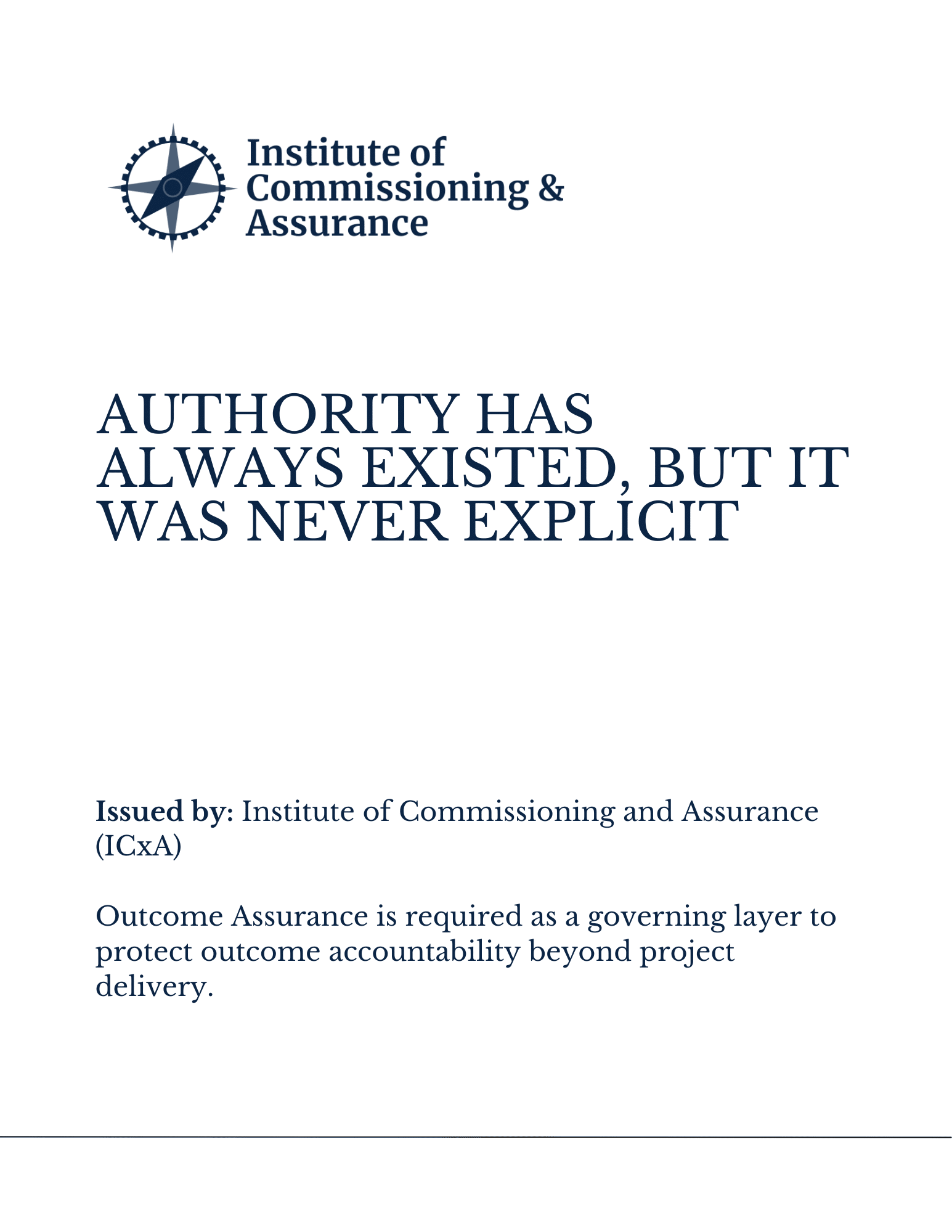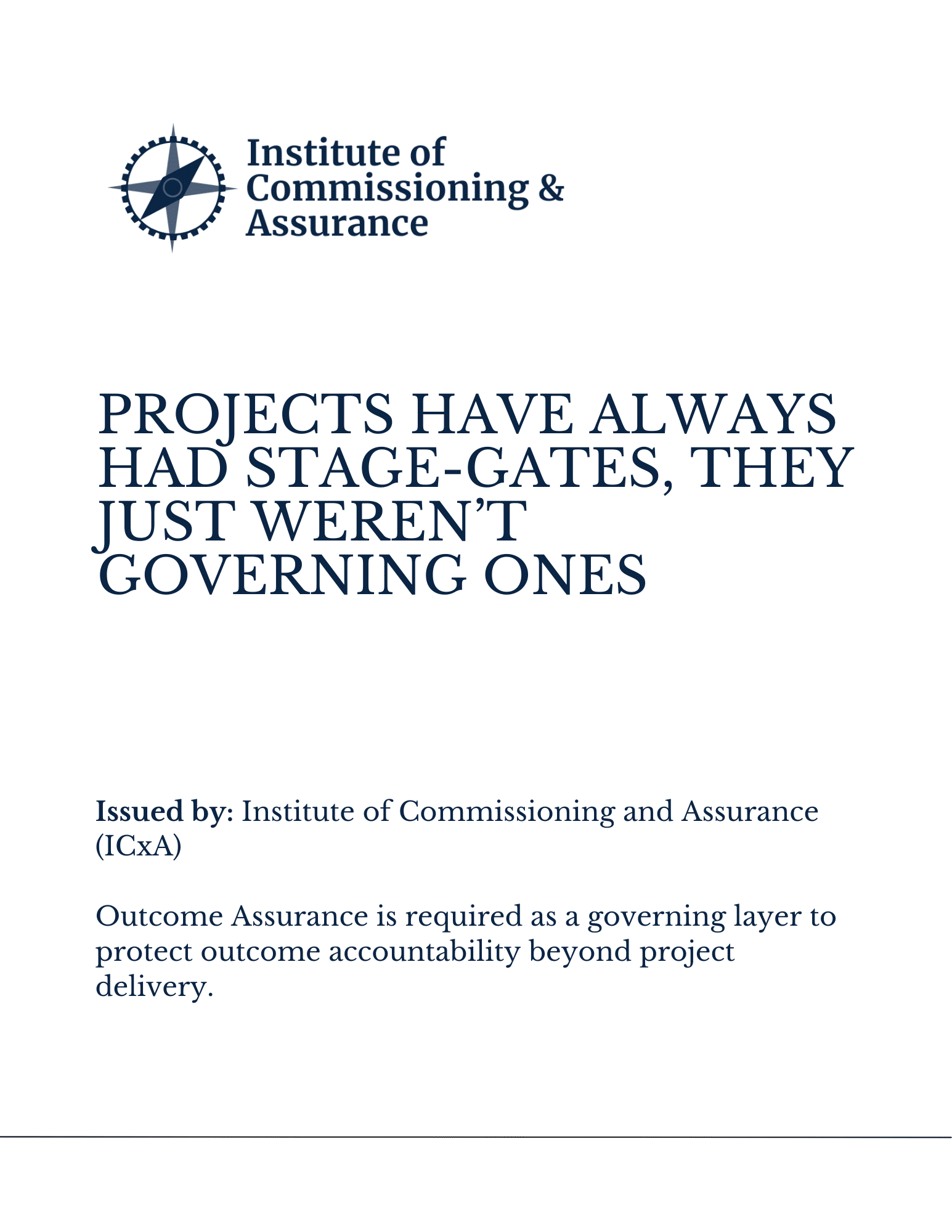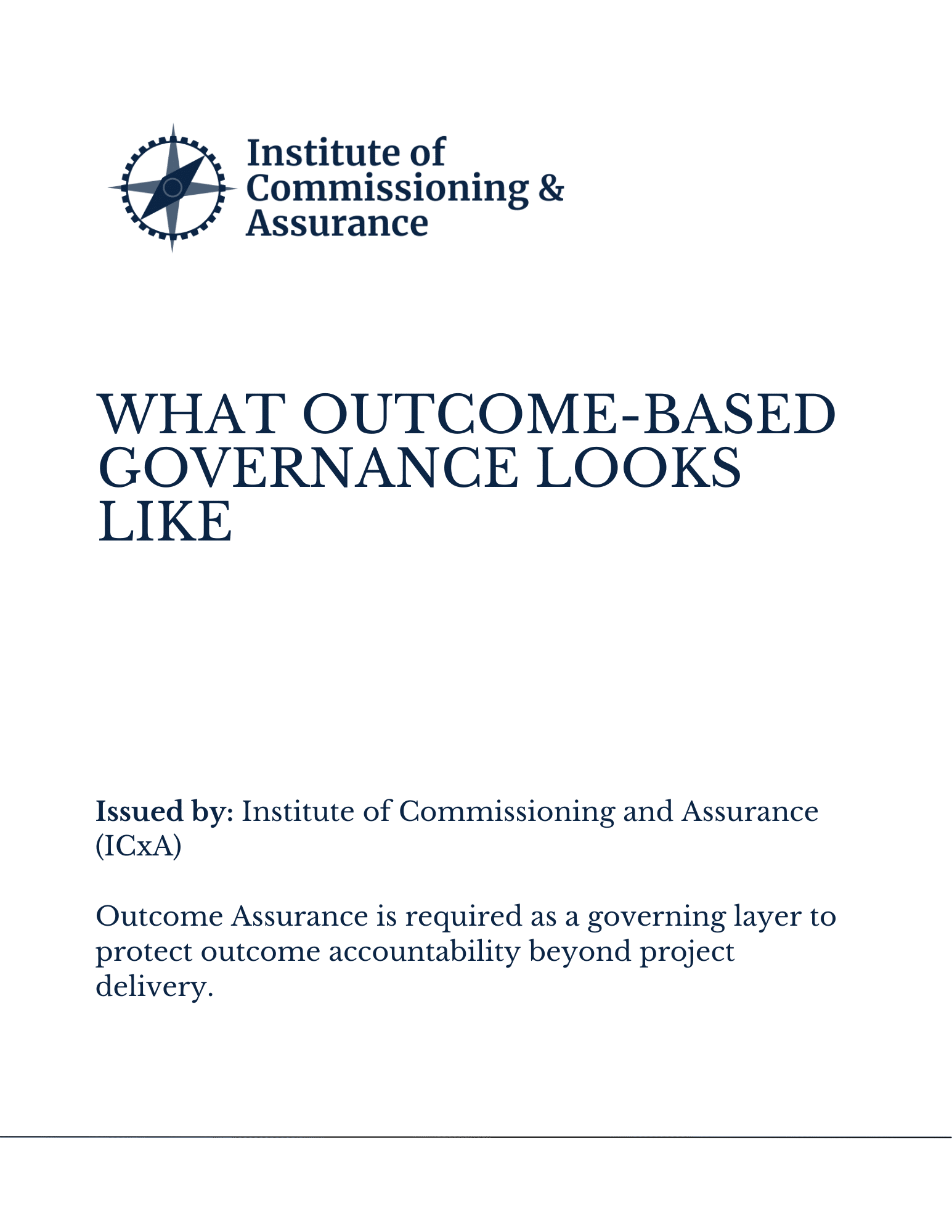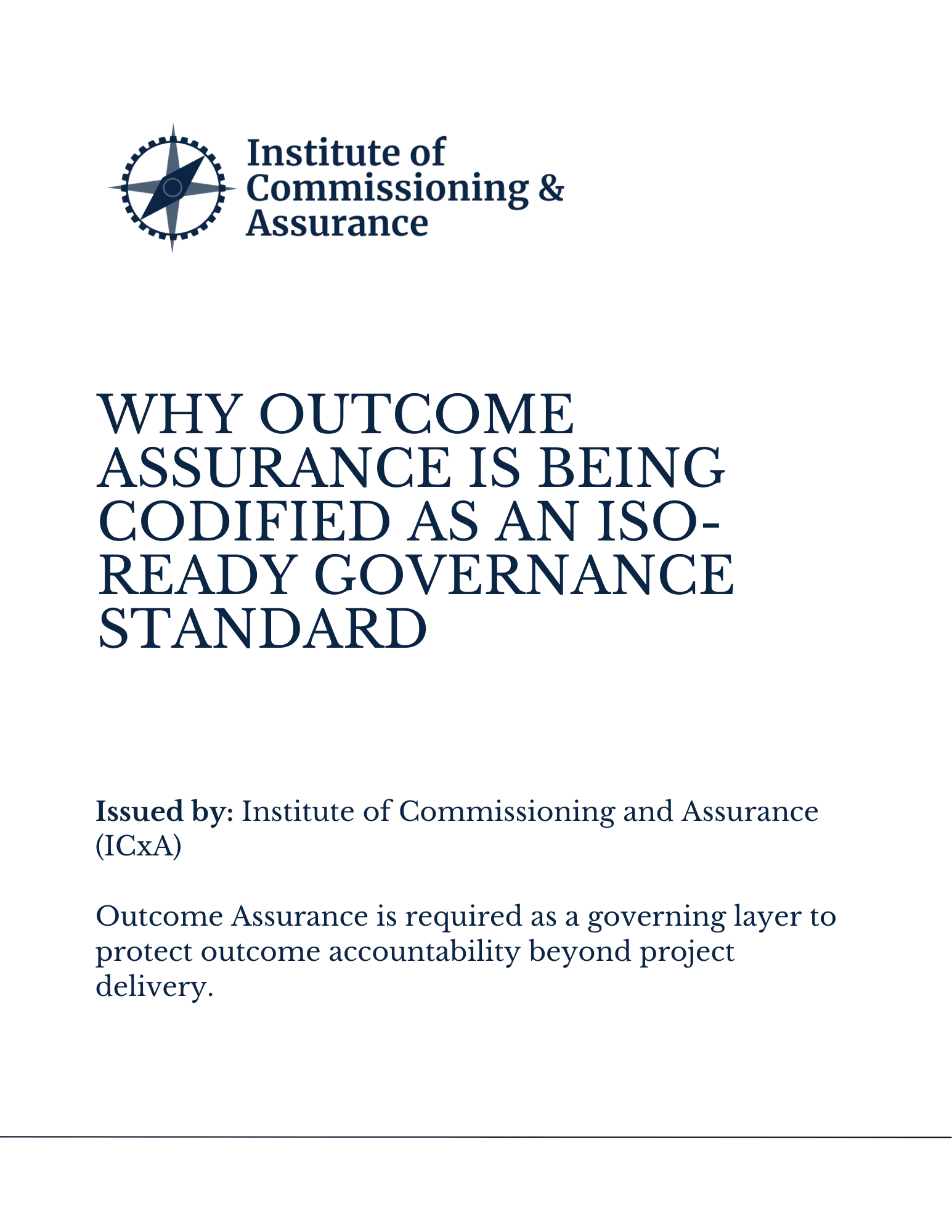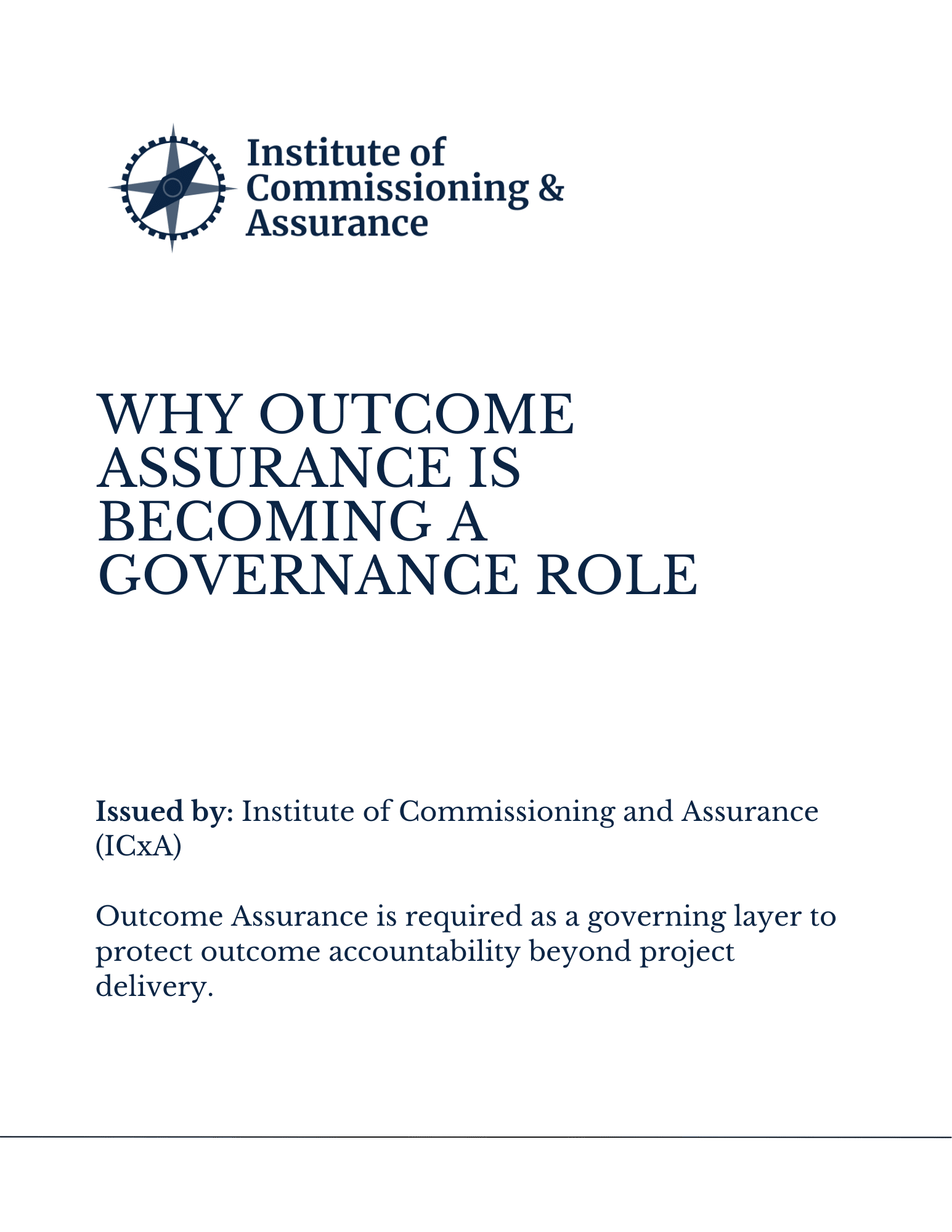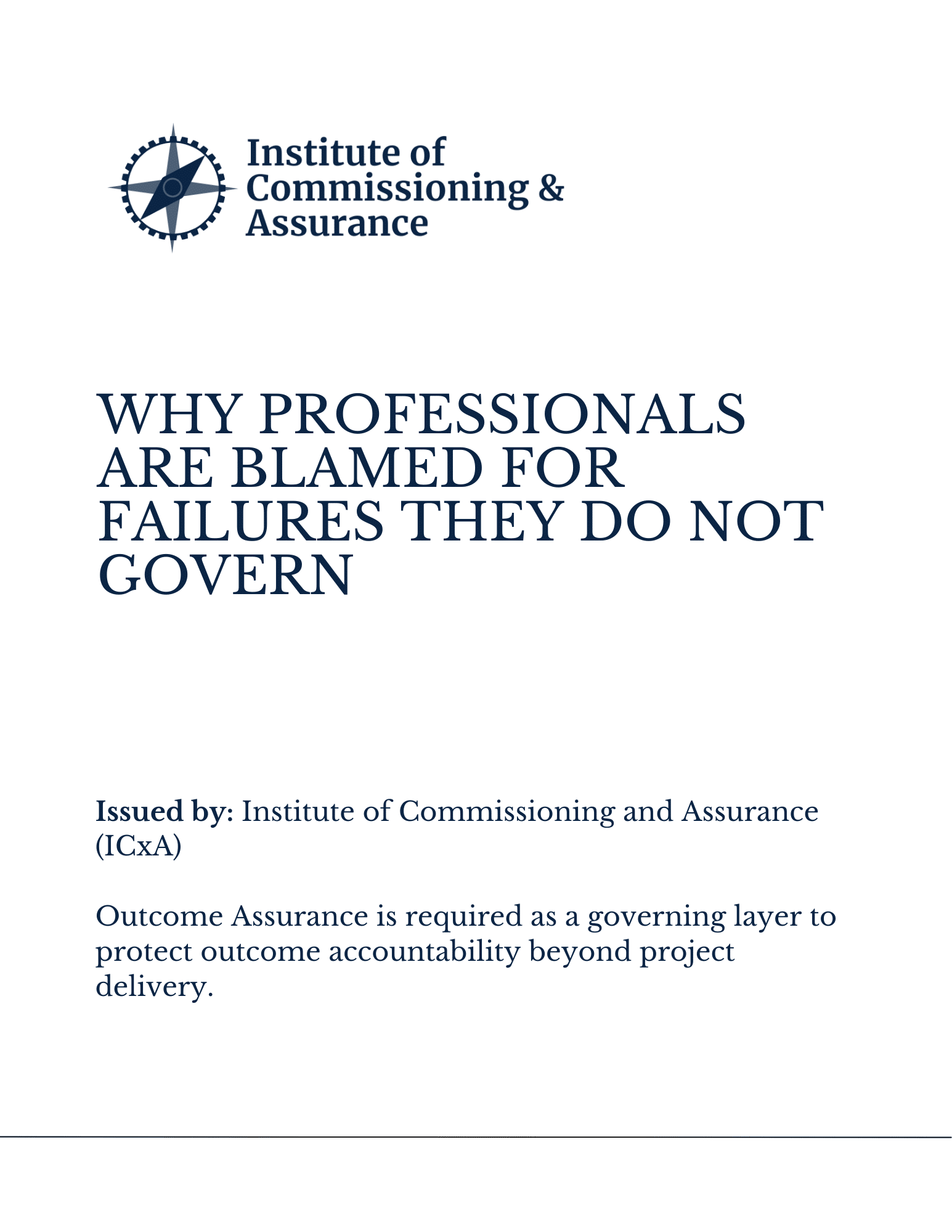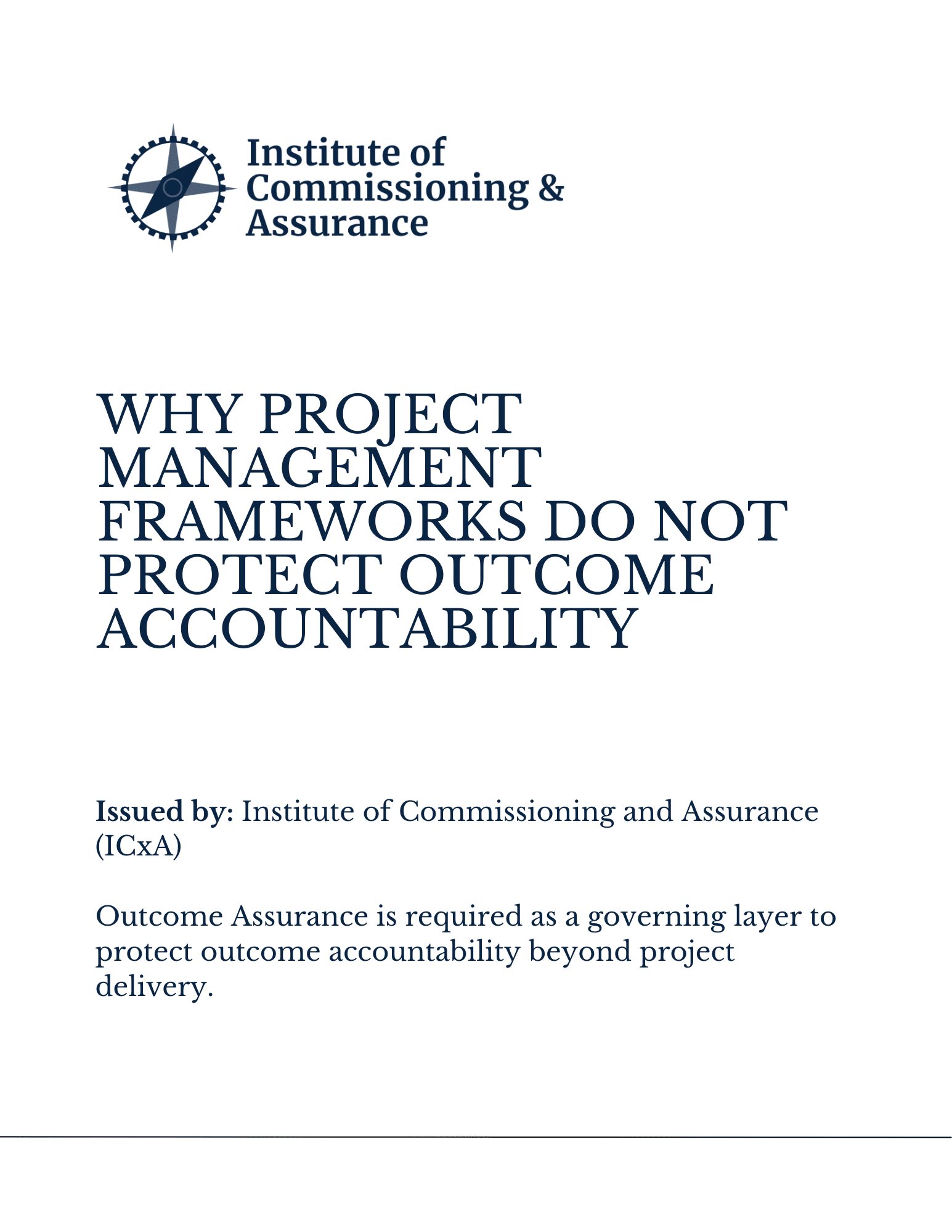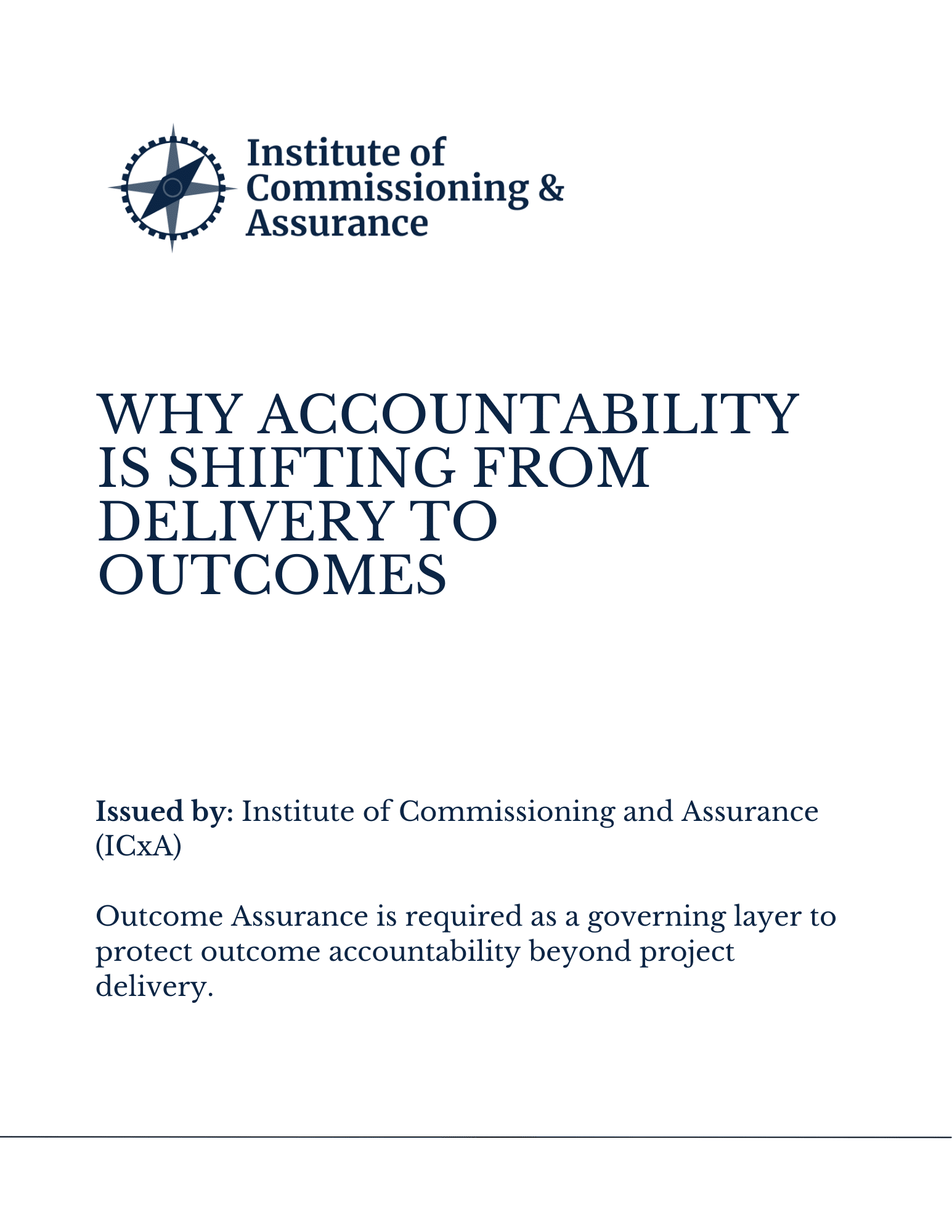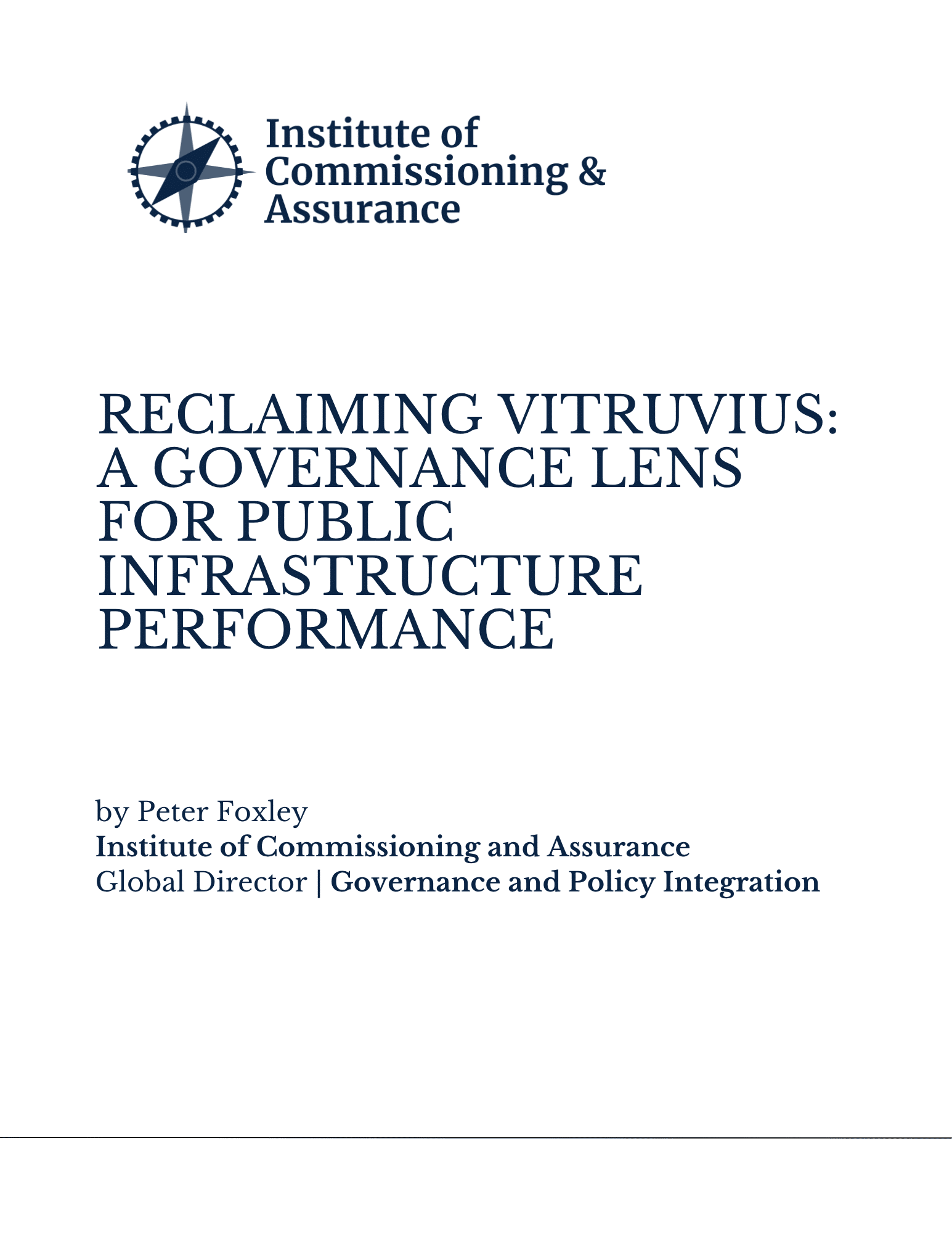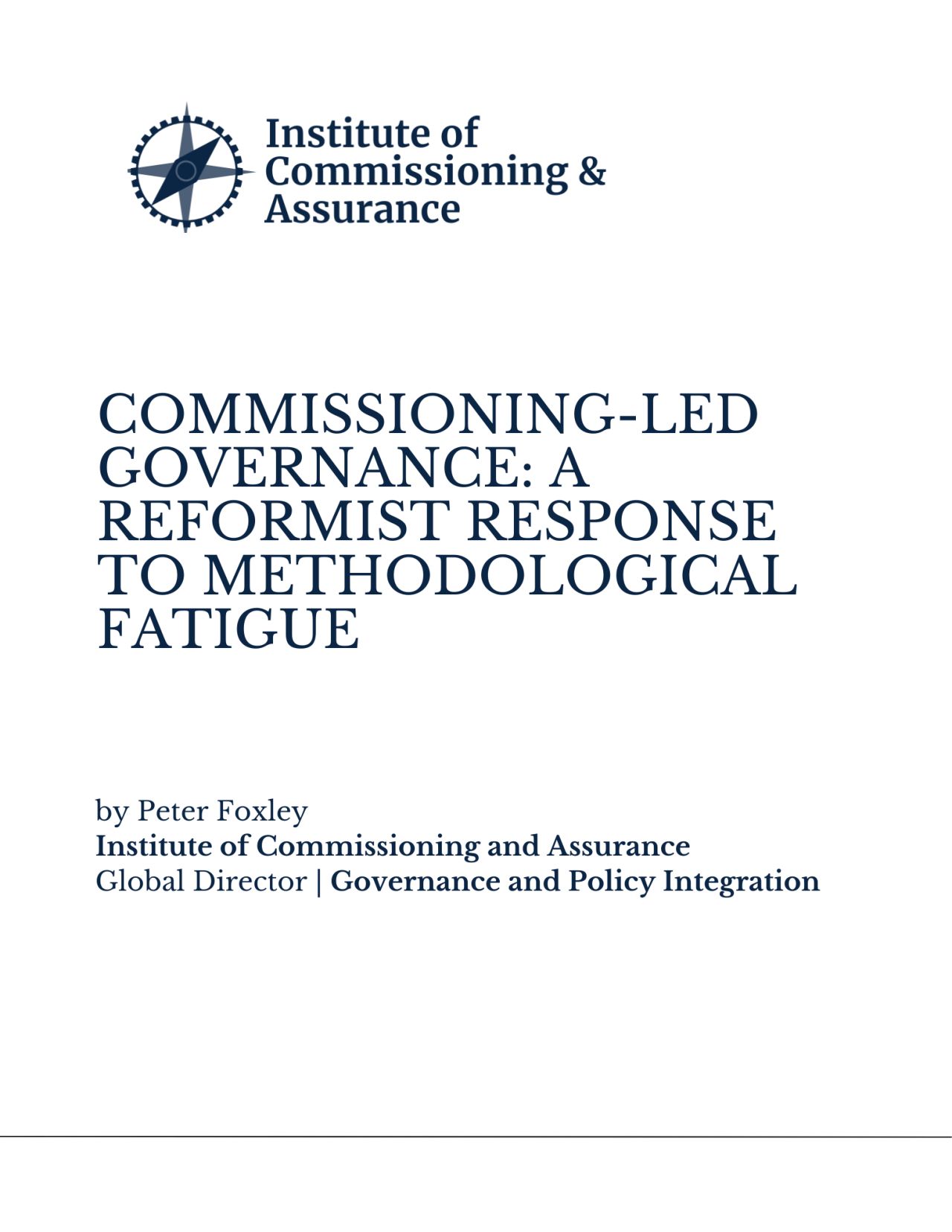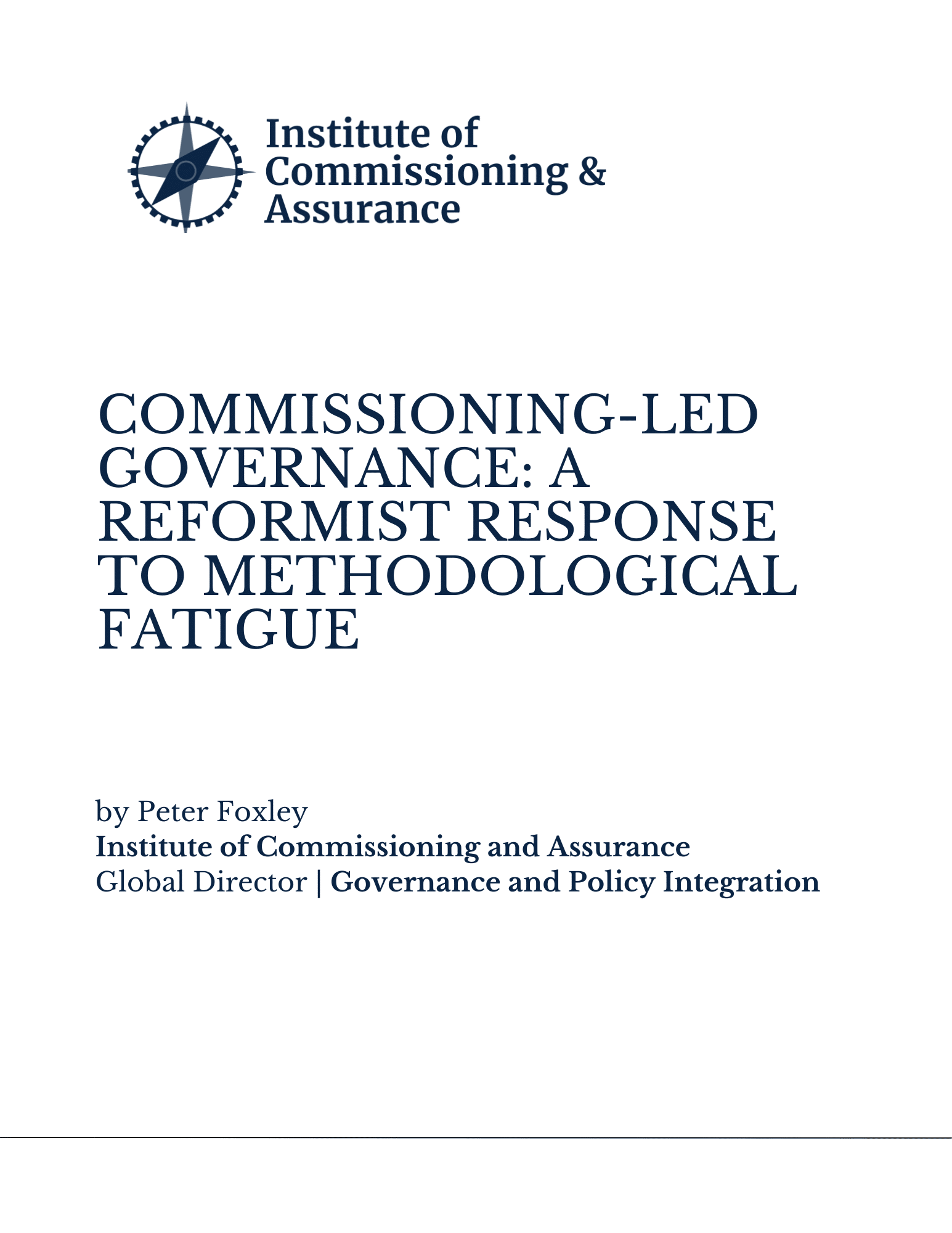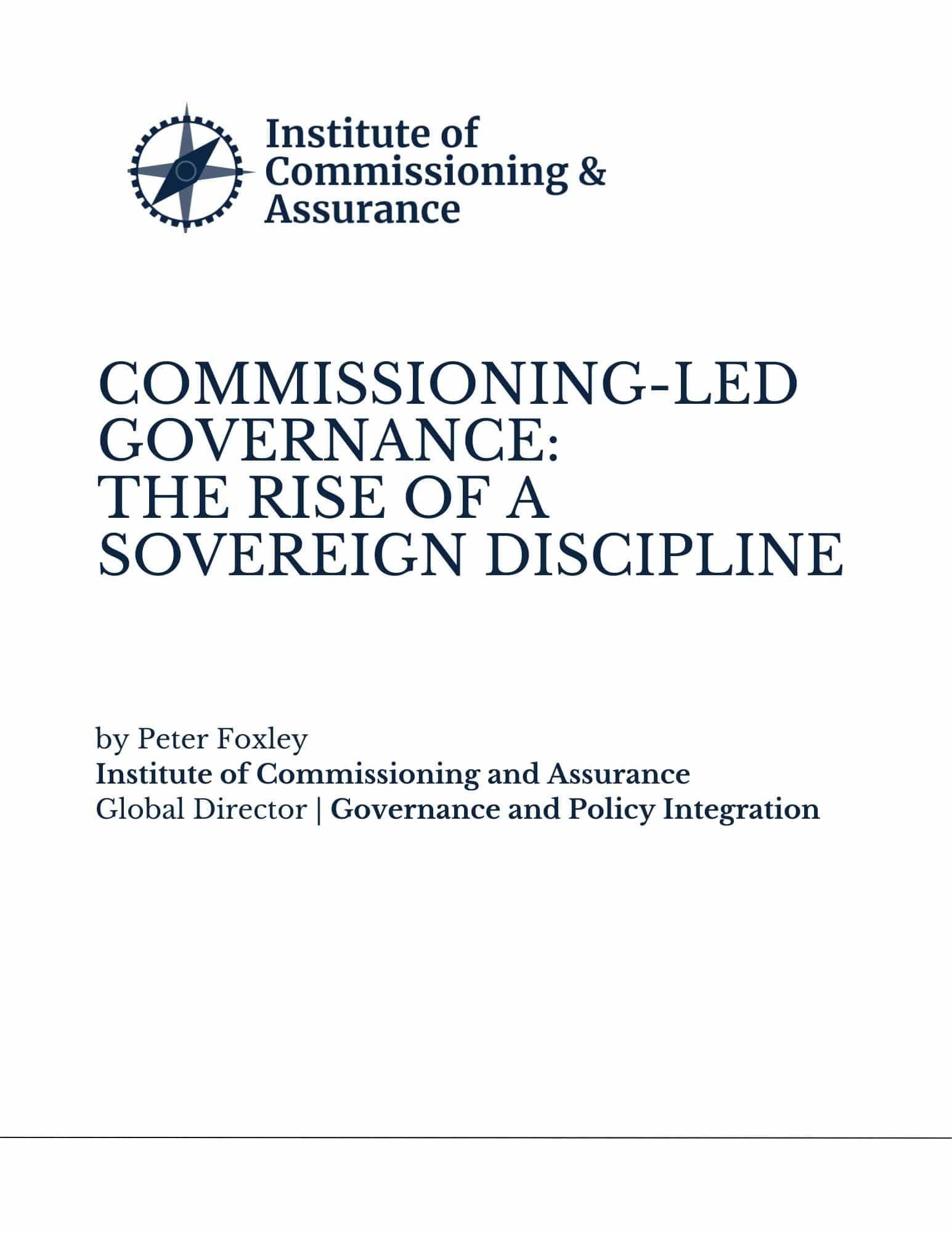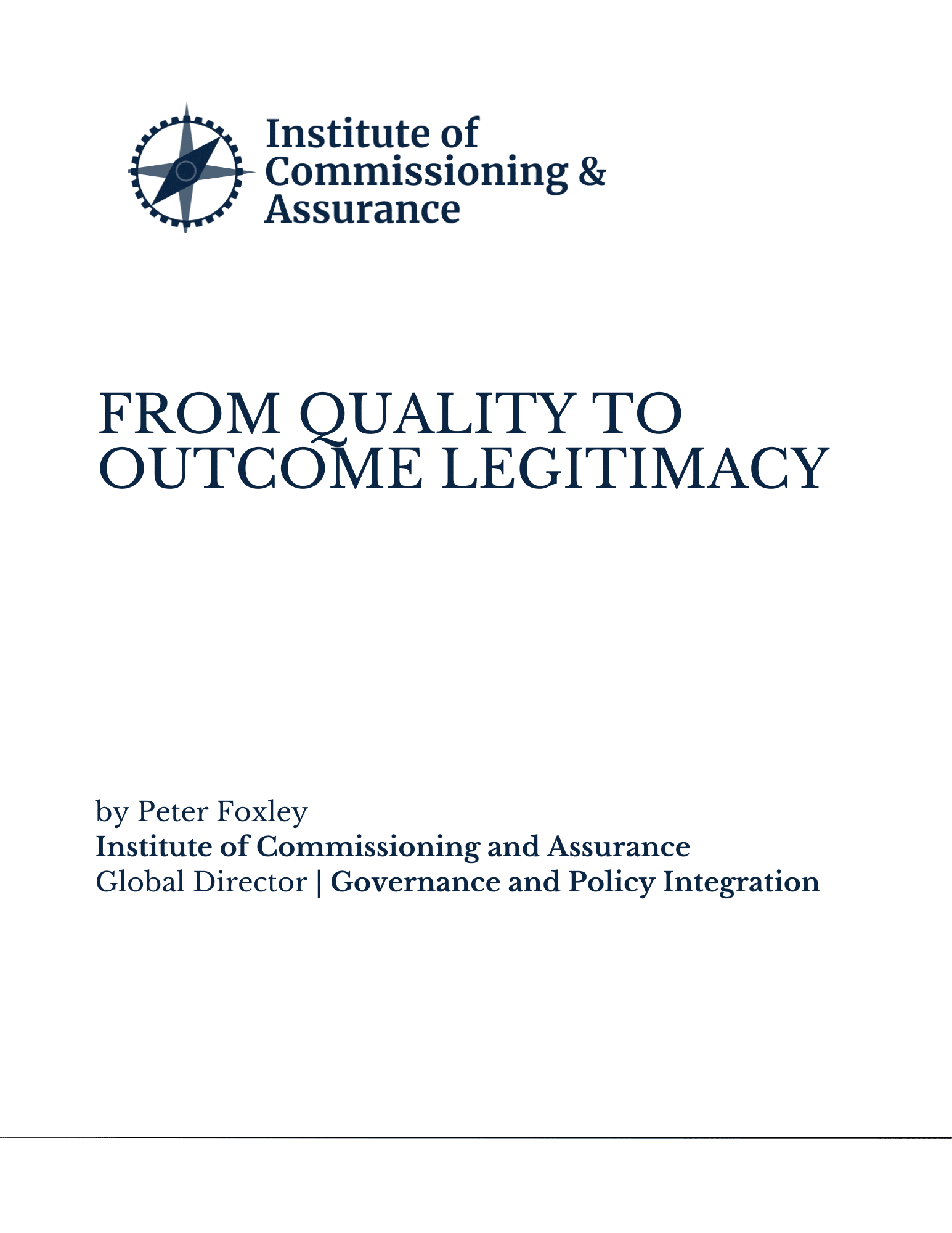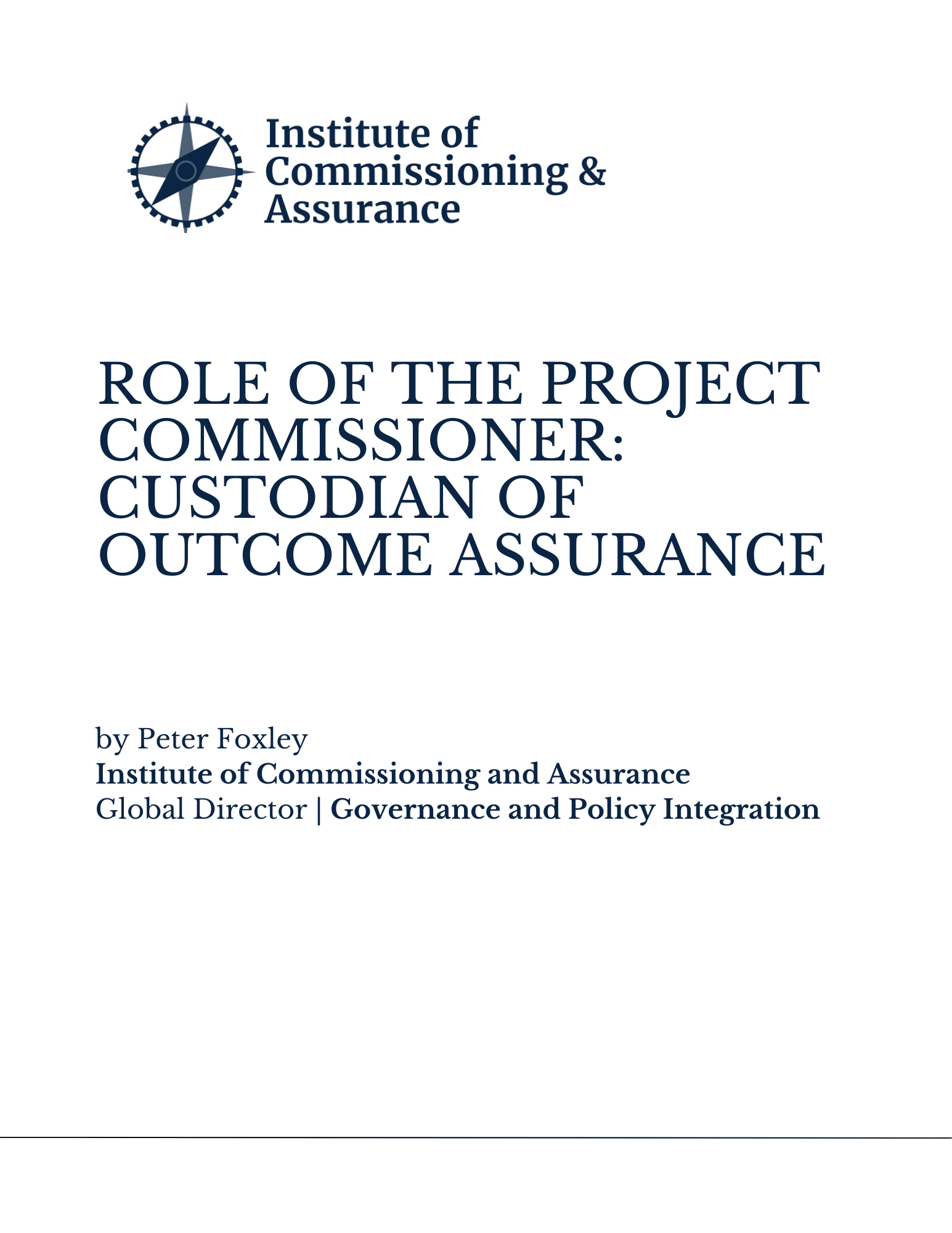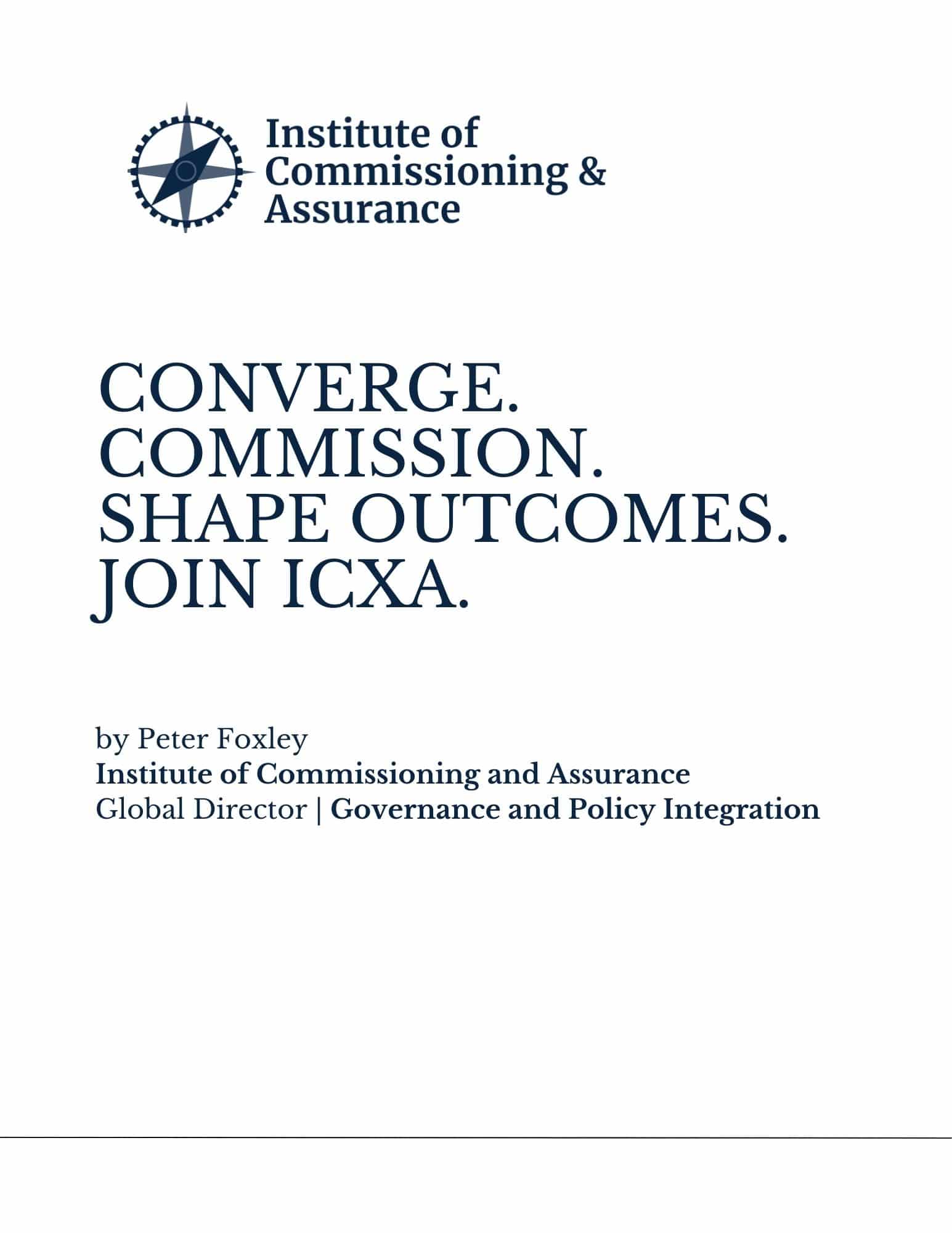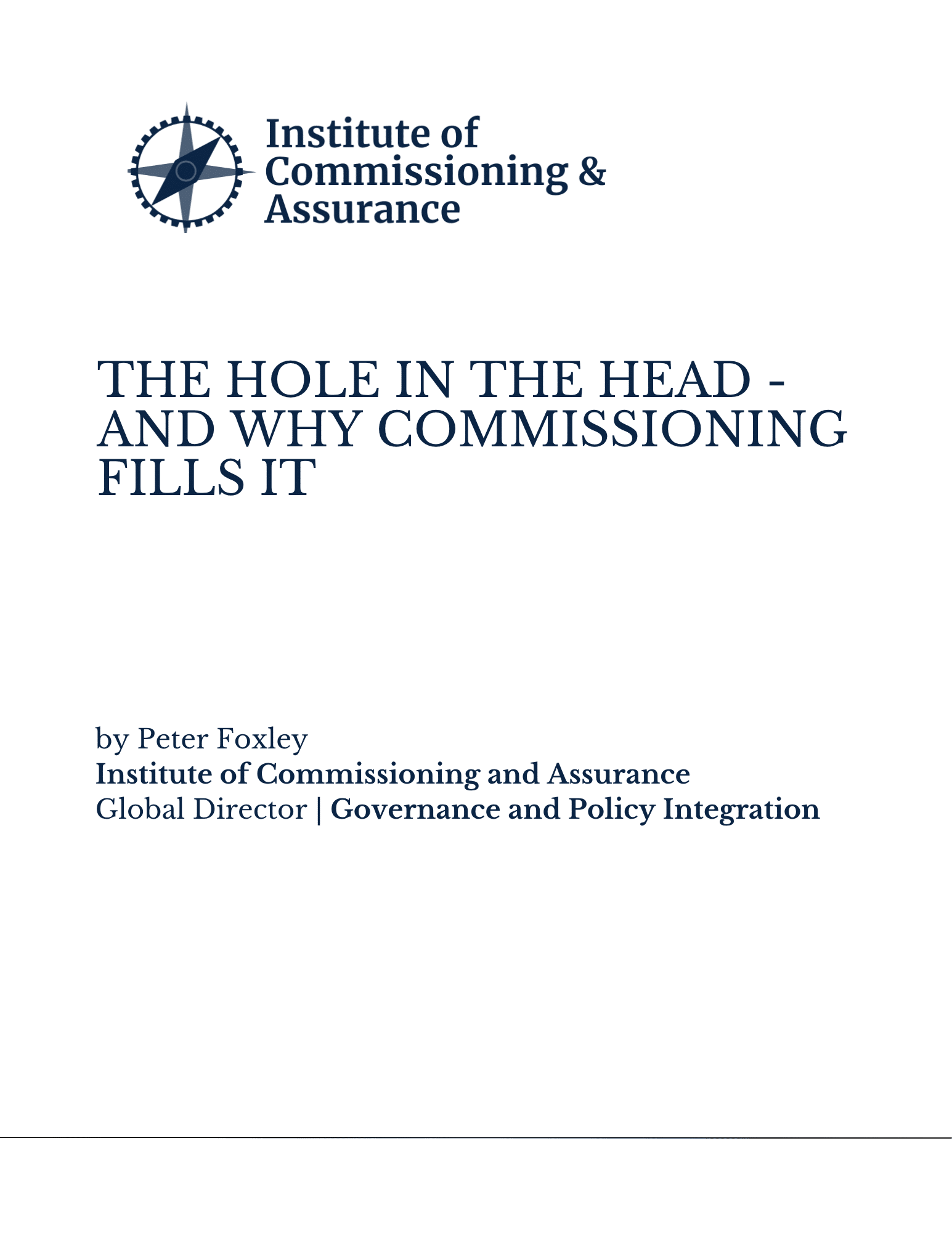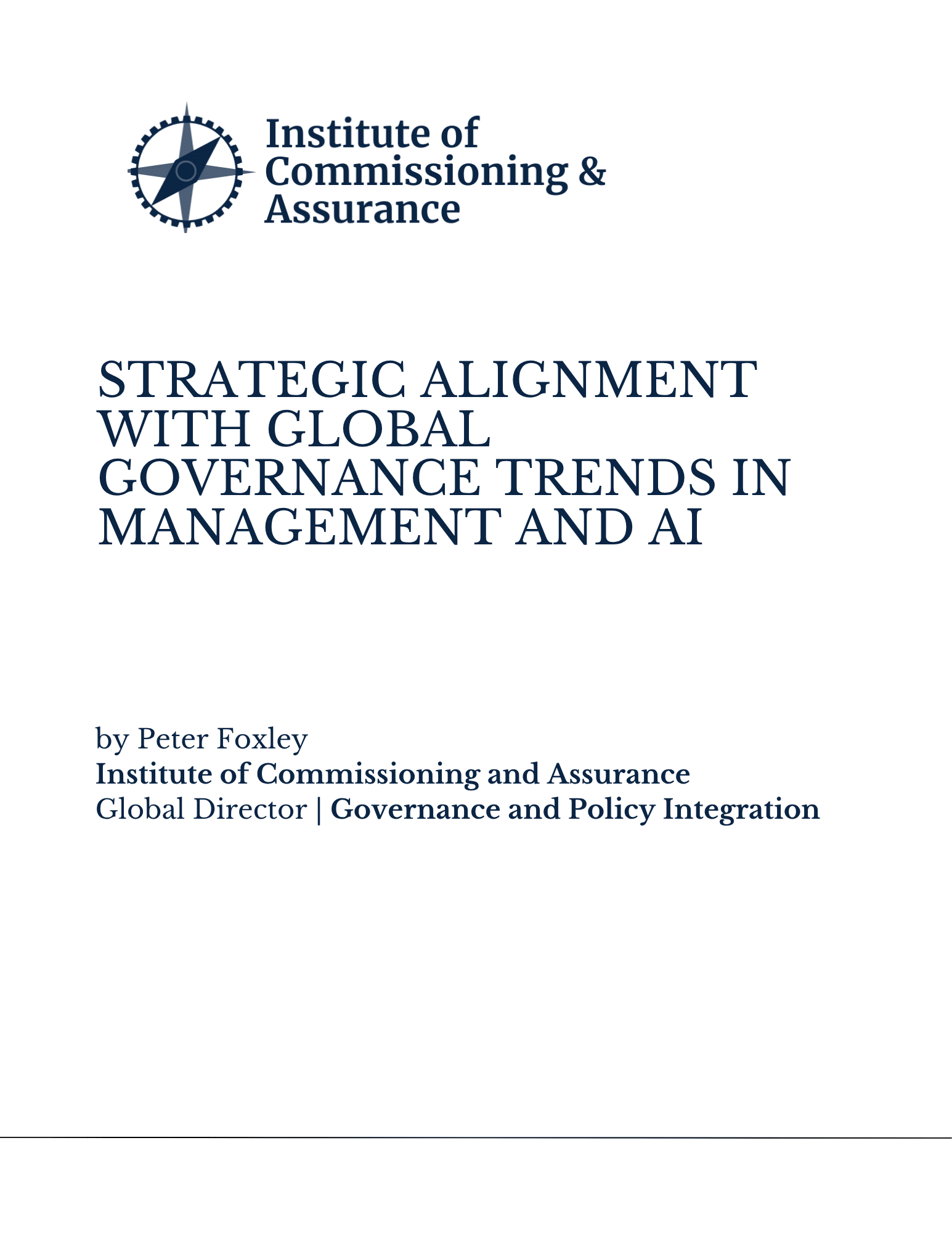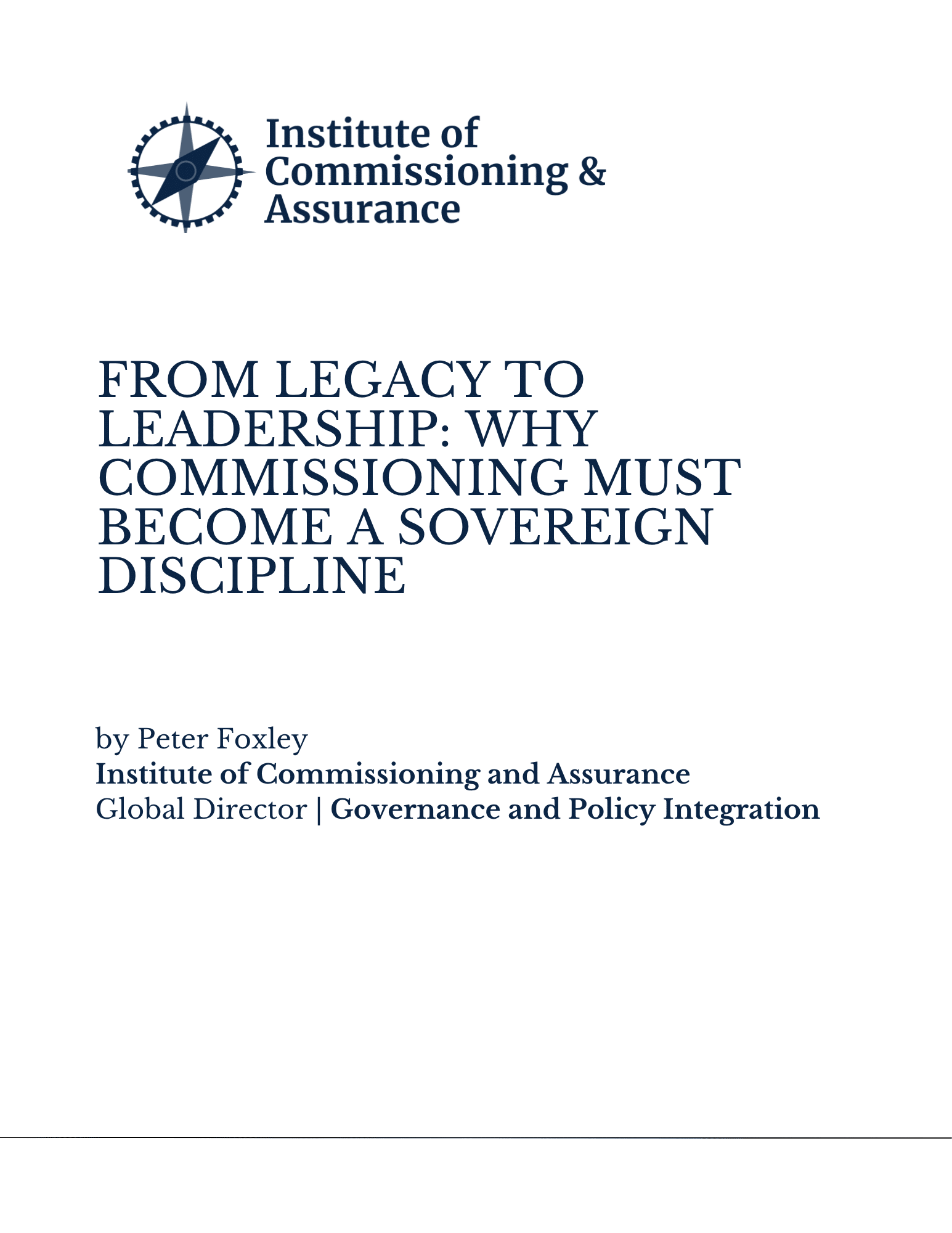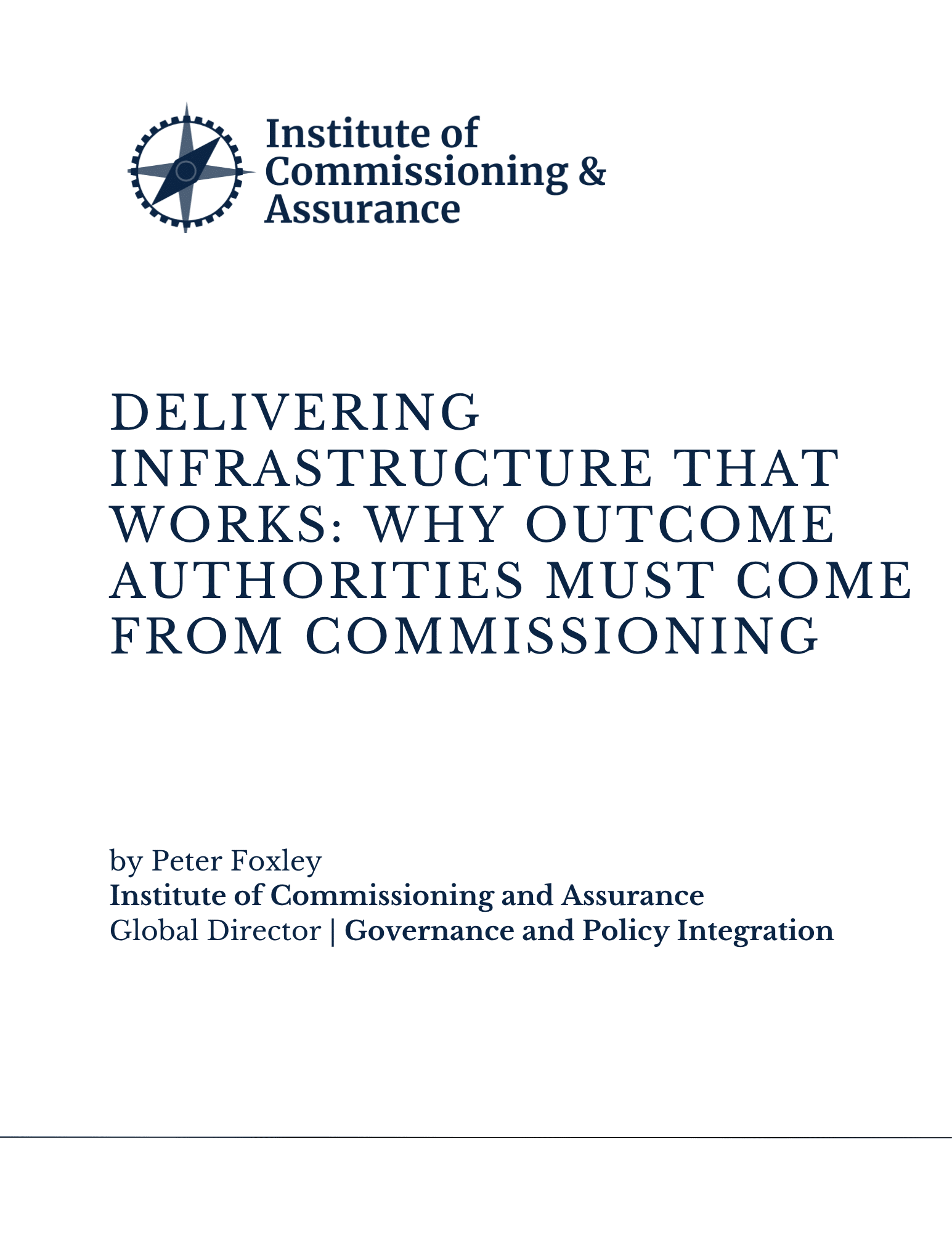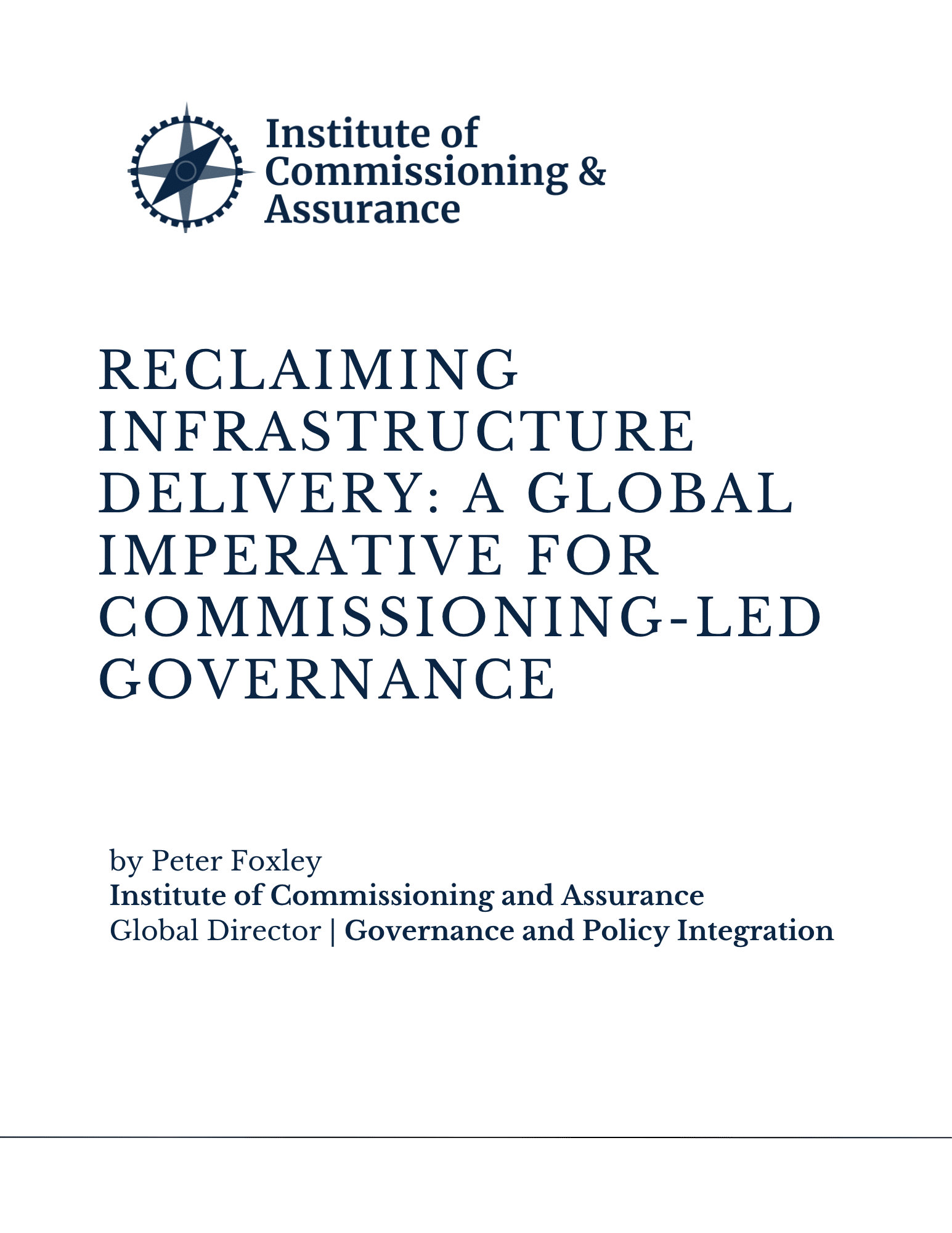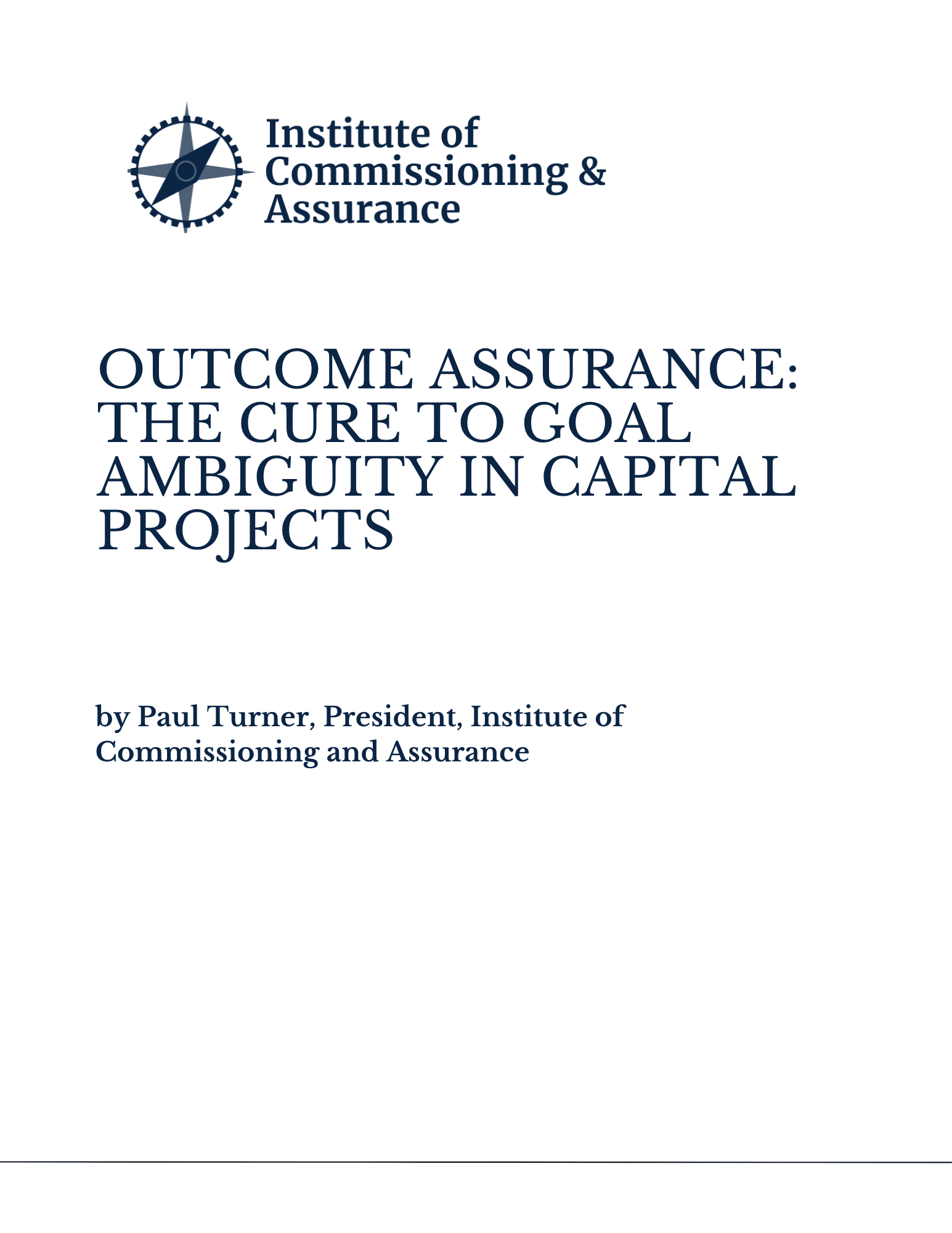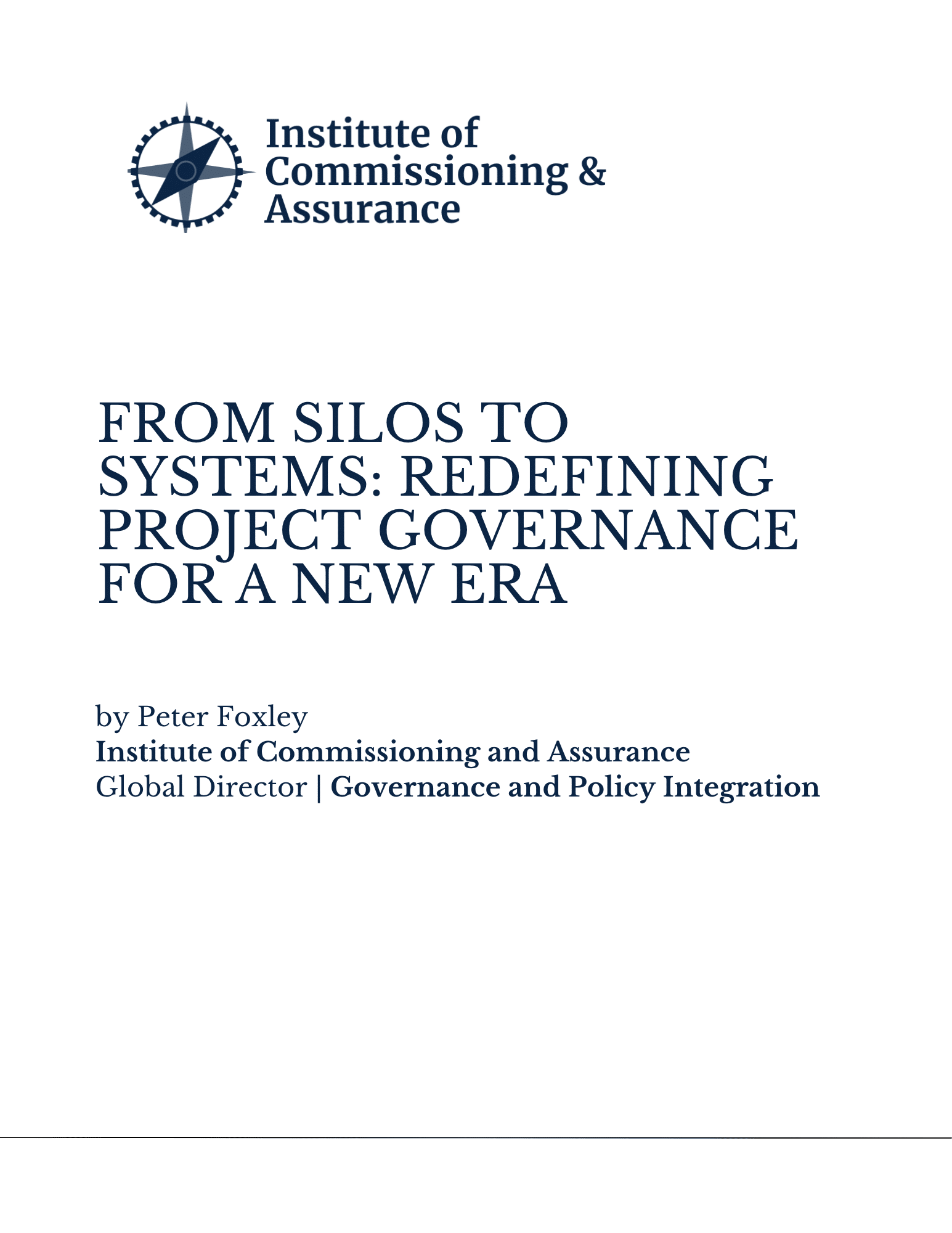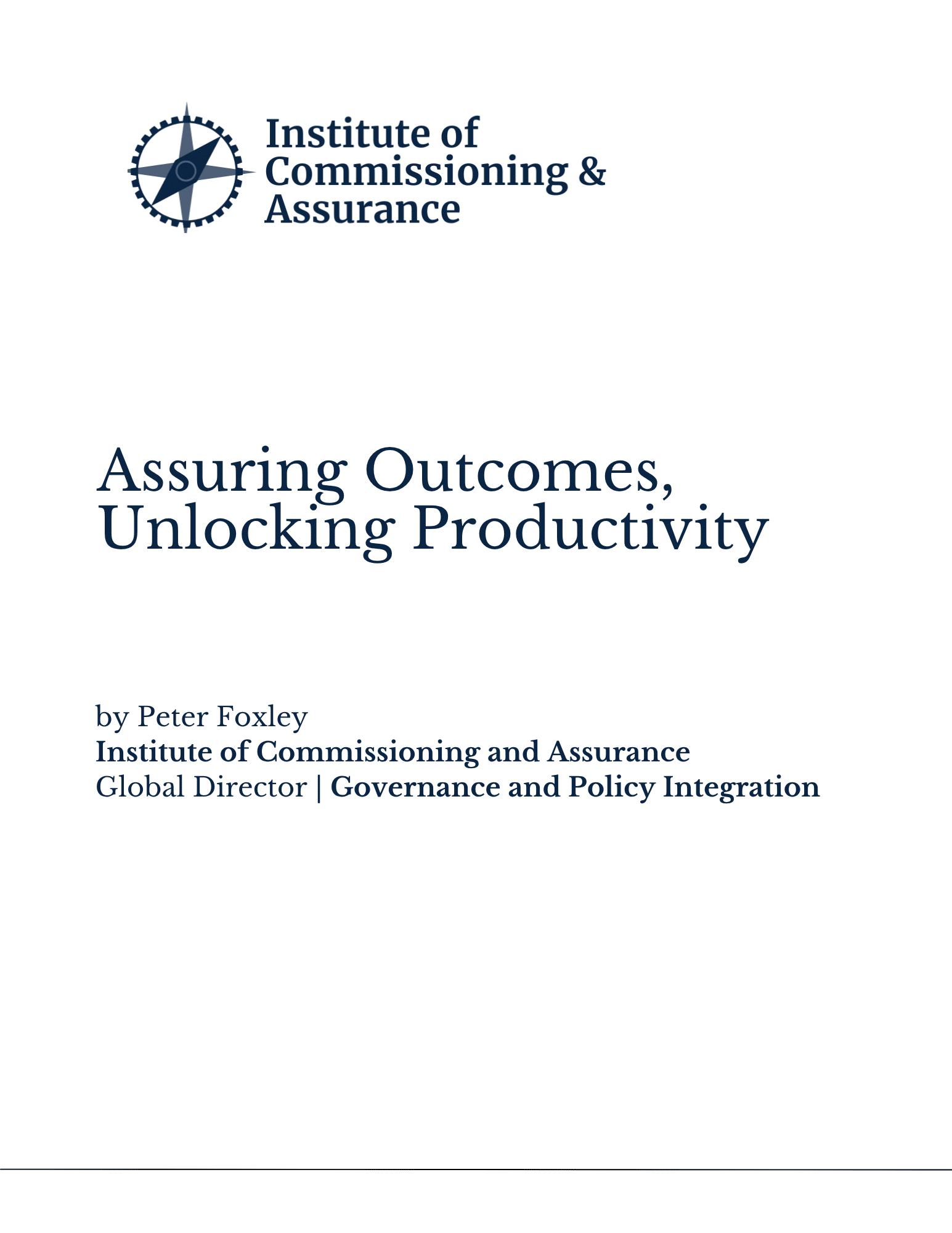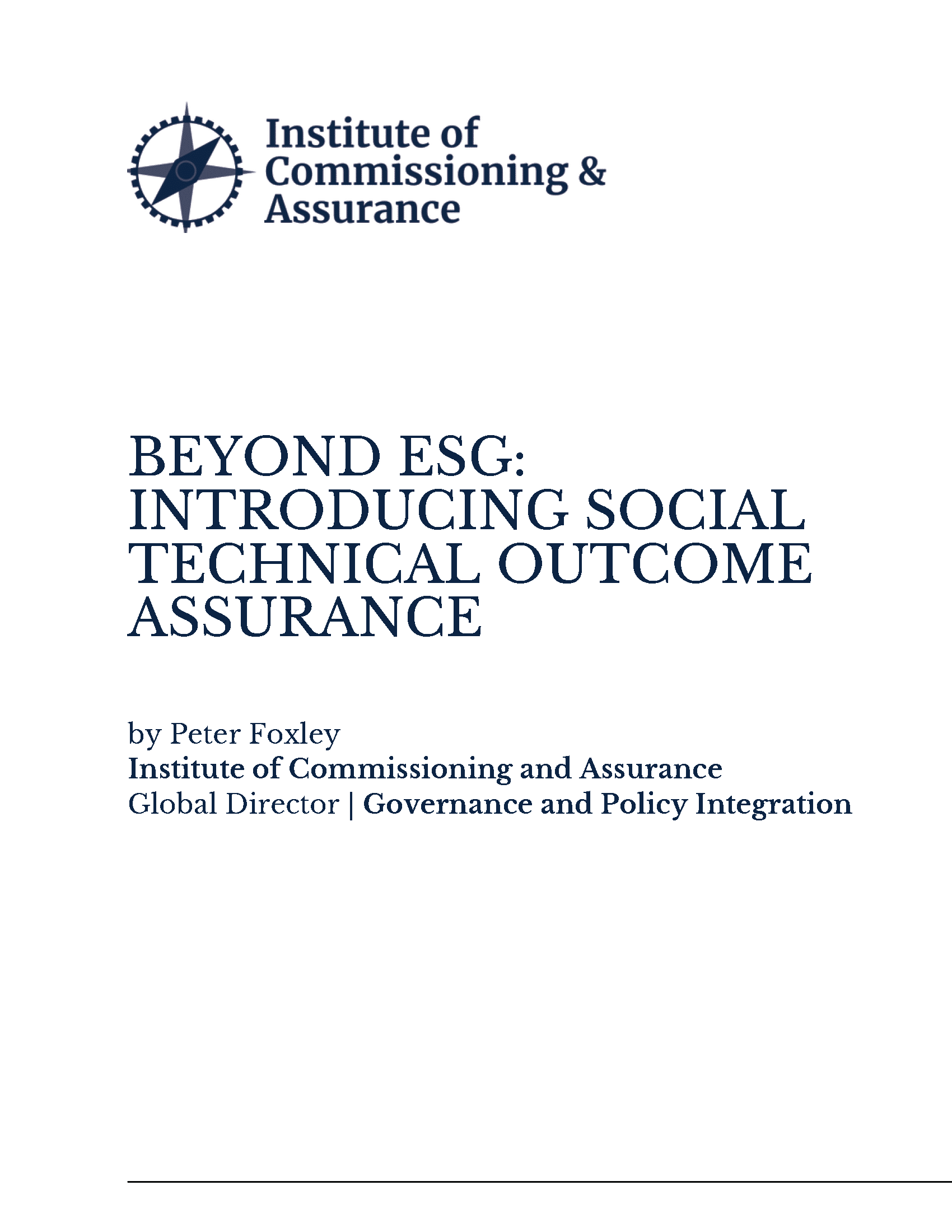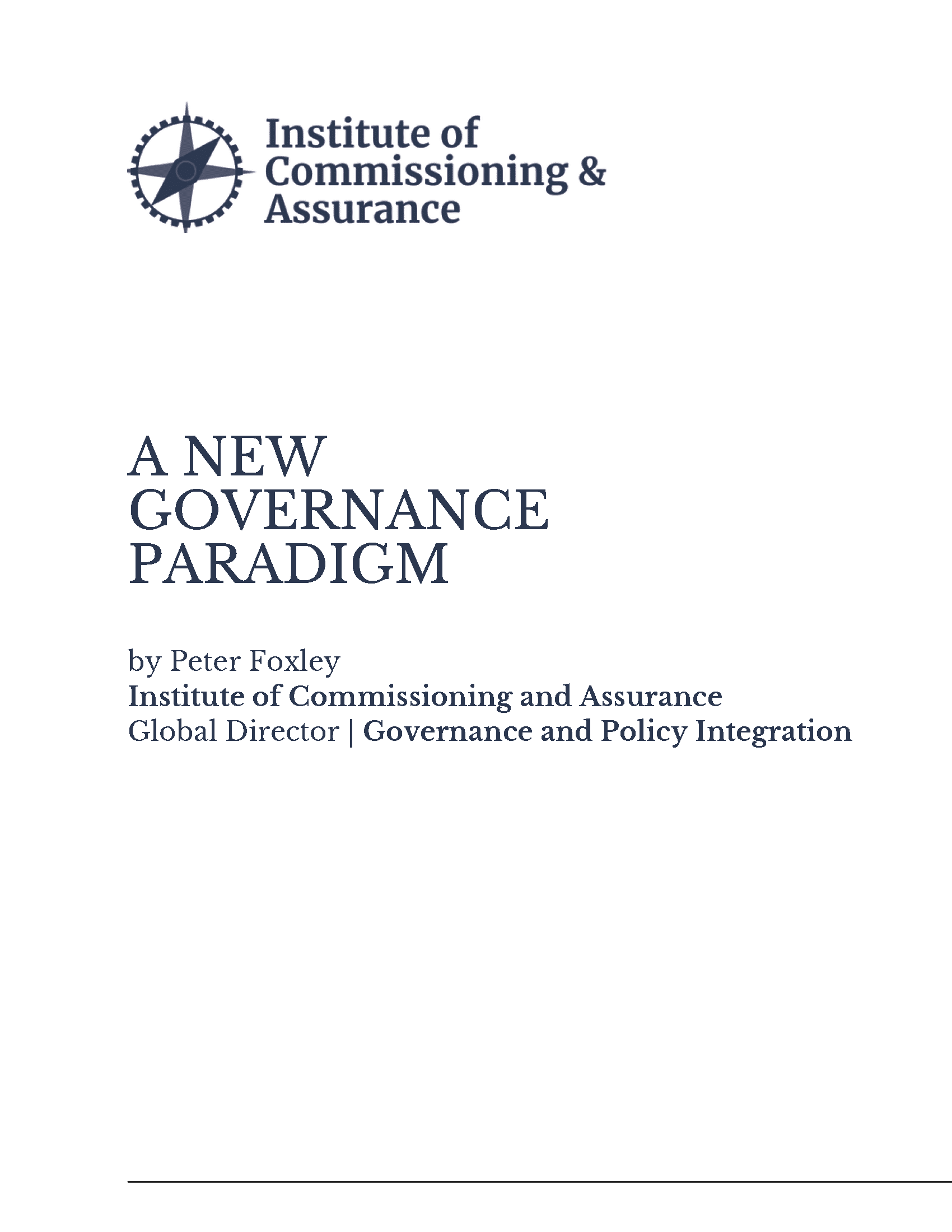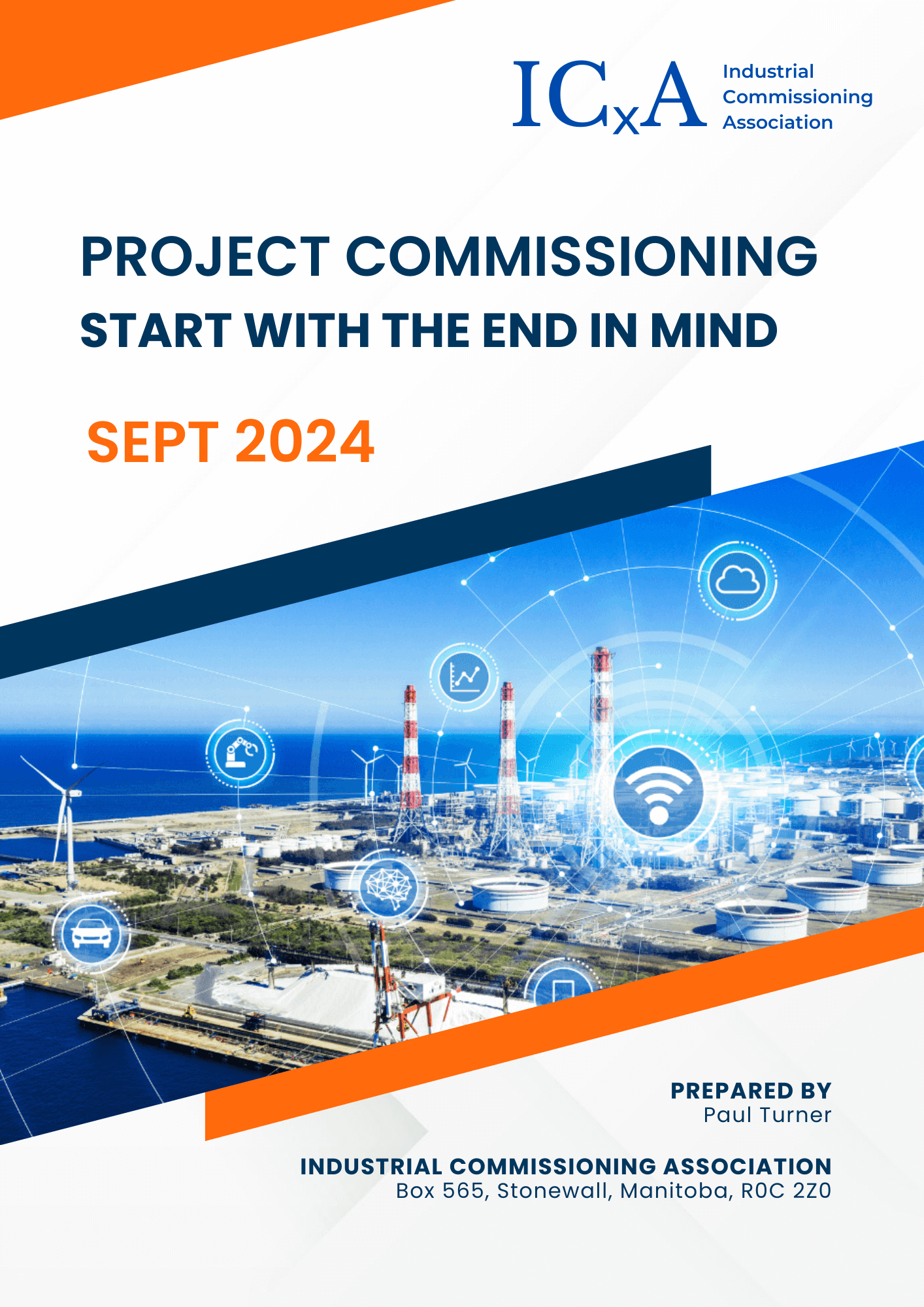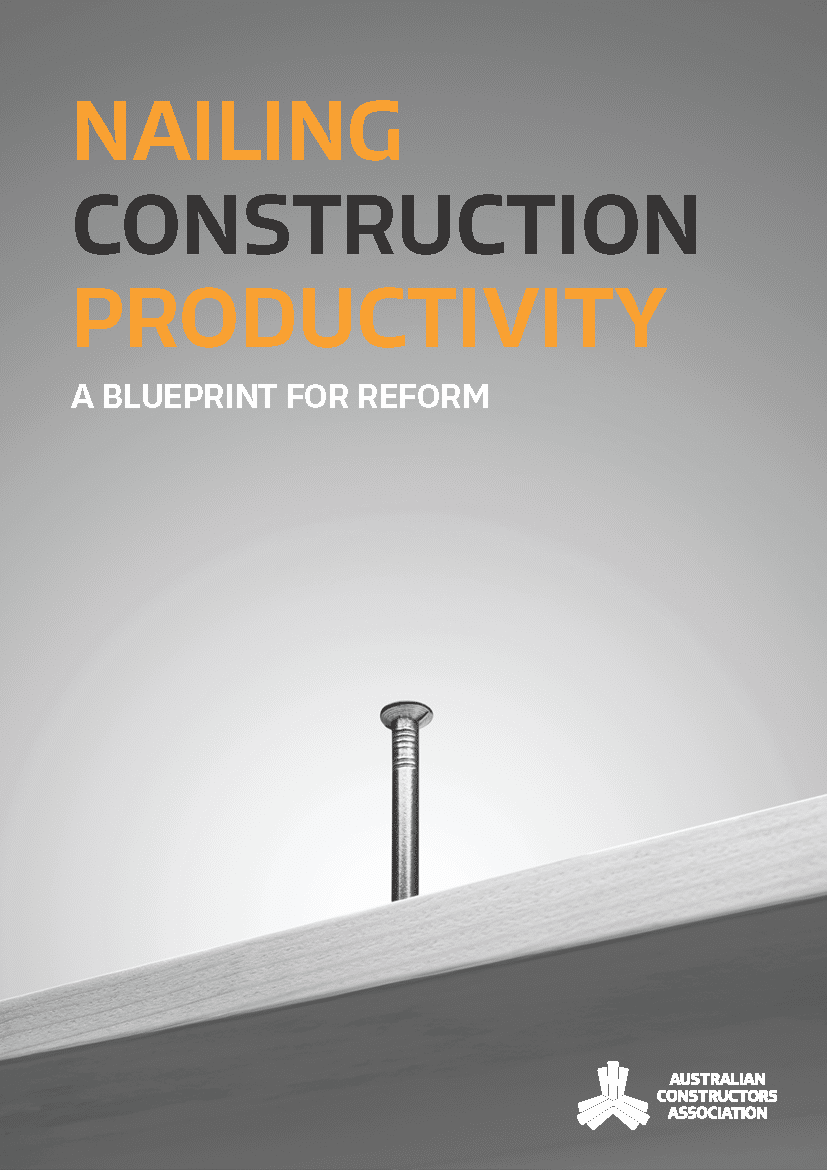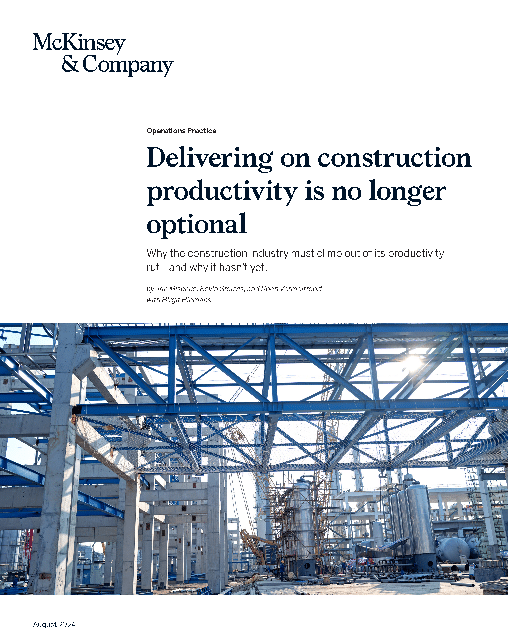Discussion Papers
Thought Leadership by ICxA
Read more and download reports issued by ICxA
Projects commonly delegate design, construction, integration, testing, and handover activities to third parties. This reflects the scale, specialization, and complexity of modern assets. Delegation of work is necessary. Delegation of outcome responsibility is not possible.
Outcome responsibility is established at the point of approval. Outcomes define the capability, performance, and value that justify investment. They describe what the asset must provide in operation, not merely what must be built. These outcomes are defined and accepted by owners and approving authorities. They are independent of delivery structure and are not created by contractual arrangements.
Readiness is frequently described on projects as a state of confidence or comfort. Teams report that they are “ready,” leaders indicate that readiness has been achieved, and schedules assume readiness once defined activities are complete. While common, this approach treats readiness as a subjective condition rather than a governed decision.
For the purposes of Outcome Assurance, readiness is understood as a formal authorization decision. It is the decision that an outcome may proceed to the next stage of exposure, use, or reliance. Readiness is not achieved through progress, agreement, or passage of time. It is achieved only when an authorized role evaluates defined evidence and records a decision to proceed.
Projects have never been delivered without authority. Decisions regarding readiness, acceptance, and release into operation have always been made in some form. Assets are energized. Systems are placed into service. Facilities are occupied and used. These actions are not merely administrative or procedural, they constitute authorizations. They represent the point at which responsibility and risk shift from delivery activities to operational use, and where the intended outcome of the project is “assumed” to be achieved.
The central issue is not the absence of authority. The issue is that outcome authority has rarely been made explicit, deliberate, or governed.
Projects commonly implement defined stage-gates. These gates are embedded across each project phase and are used to control delivery. Typical examples include design completion, construction completion, mechanical completion, handover, and close-out. These points of transition are routinely tracked, reported, and, in many cases, linked to contractual and commercial controls.
These stage-gates are necessary for managing delivery. However, they do not function as governing stage-gates. Their purpose is to confirm progress through delivery phases, not to authorize outcomes. This distinction is material and has direct implications for accountability, risk, and trust.
As accountability for outcomes moves decisively into governance, organizations are increasingly asking a practical question: what does outcome-based governance actually look like?
This paper explains the operating logic of Outcome Assurance as a governance system. It describes how outcomes are governed through clear decision authority, evidence-based authorization, and lifecycle continuity—without prescribing delivery methods, technical solutions, or contractual mechanisms.
Outcome Assurance is presented not as a framework or methodology, but as a governance model for making and authorizing outcome decisions.
Across sectors, projects are increasingly delivered without reliably achieving the outcomes they were approved to deliver. While awareness of this problem is growing, the absence of a formal, globally recognized governance framework for outcome accountability has persisted. The ISO Outcome Assurance Standards are being developed to address this gap.
This position paper explains why Outcome Assurance is being codified as an ISO-ready governance standard, how it fits within the existing standards ecosystem, and why outcome accountability now requires the same level of rigor applied to quality, safety, and risk.
Across complex projects and major programs, responsibility for outcomes is shifting from delivery functions into governance. This shift reflects a growing recognition that traditional delivery-focused governance models are no longer sufficient to protect outcomes in increasingly complex, integrated, and high-consequence environments.
Outcome Assurance is emerging not as a technical discipline or delivery activity, but as a governance role – one that protects strategic intent, authorizes progression based on evidence, and holds accountability for outcomes beyond project completion.
Across complex projects, failure is frequently attributed to the professionals closest to delivery. Engineers, project managers, commissioning teams, and operators are held responsible when outcomes fall short, even when they lacked the authority to govern the decisions that shaped those outcomes. This position paper explains why this misalignment persists and why Outcome Assurance is required to realign accountability with authority.
Project Management (PM) frameworks play a critical role in structuring and controlling project delivery. They provide discipline around planning, execution, reporting, and control, and they remain essential to modern project environments. However, persistent underperformance across major projects demonstrates a structural limitation: PM frameworks do not protect accountability for outcomes.
Projects regularly achieve formal completion without reliably delivering the outcomes they were justified on. This position paper explains why this occurs, identifies the governance gap responsible for the failure, and articulates why Outcome Assurance is required as a distinct governing layer above project management.
Major capital projects have historically been governed through delivery-based accountability. Oversight has focused on whether scope was completed, schedules were met, and budgets were controlled. These measures have been embedded in contracts, reporting frameworks, and assurance processes across the public and private sectors.
While delivery discipline remains essential, experience across jurisdictions demonstrates that delivery performance alone is not a reliable predictor of long-term asset performance, public value, or risk exposure. Projects may be delivered in accordance with contractual requirements yet still fail to achieve their intended operational, economic, or societal outcomes.
For over two millennia, the Vitruvian Triad – Firmitas (strength), Utilitas (utility), and Venustas (beauty) – has shaped the design of buildings and cities. But in today’s age of complex infrastructure systems, climate imperatives, and rising public accountability, these classical principles are not just relevant – they are essential.
When reframed through the ICxA Outcome Standard Roadmap, the triad becomes a credentialed governance tool – one that validates public-serving design, operational performance, and lifecycle integrity. It is no longer a philosophical ideal; it is a dual-governance architecture that embeds commissioning into every phase of infrastructure delivery.
Crossrail’s eventual success is undeniable. Yet the journey to completion exposed systemic governance weaknesses that have been documented in detail by independent reviews. This paper does not diminish the achievement; rather, it seeks to honour it by ensuring the lessons are embedded in future practice.
Our perspective is grounded in a wide body of authoritative reports – including those from the National Audit Office, the Infrastructure and Projects Authority, and the Department for Transport – which together provide a comprehensive record of the programme’s governance challenges and delivery risks.
For ICxA, these findings underscore a central lesson: commissioning-led governance and outcome assurance must be embedded at the sponsor and governance level, not delegated to construction groups, programme partners, or delivery contractors.
Across the Architecture, Engineering, Construction, and Operations (AECO) sector, legacy methodologies – once designed to manage complexity – are increasingly viewed as ritualised, compliance-driven artefacts. As Robertson Davies once quipped, “Planning is what people do instead of thinking.” That sentiment echoes across critiques of PMBOK, Six Sigma, JIT, and PERT, where toolsets have drifted from their original intent. What began as innovative and exploratory, now risk becoming executive devices for evading accountability – especially when certification becomes the goal rather than capability.
Projects need a new breed of leadership – outcome-focused leadership that can lead large teams through complex challenges to achieve project outcomes.
In an era defined by complexity, interdependence, and outcome accountability, commissioning is no longer a transactional function – it is a sovereign discipline. From health systems to infrastructure, education to justice, commissioning has evolved into the strategic backbone of public value creation. Yet its institutional recognition remains fragmented, siloed, and often misunderstood. ICxA exists to change that.
The UK Government’s release of Functional Standard GovS 002 for Project Delivery and the Teal Book marks a turning point in infrastructure governance. Unfortunately outdated project management models still dominate the discourse – prioritising activity over purpose, structure over value, and outputs over outcomes.
We can no longer pretend these outdated models deliver outcomes.
Project governance must evolve – from managing quality to assuring outcomes. That shift begins with commissioning-led systems thinking and ends with outcomes that matter, aligned with original project intentions.
The Project Commissioner is emerging as a pivotal figure in commissioning-led governance – bridging strategic intent, delivery oversight, and public value assurance. As infrastructure systems grow more complex, fragmented, and outcome-sensitive, this role must evolve from passive funder or contracting authority to active steward of system-wide coherence.
This paper defines the Project Commissioner as a transdisciplinary leader who governs complexity, aligns intent with capability, and ensures that infrastructure delivers what matters.
Infrastructure today is no longer just about building assets – it’s about delivering outcomes that matter. As complexity grows and public trust declines, professionals across project planning, engineering, asset management, and delivery are being called to lead differently.
ICxA is the professional home for those ready to step beyond silos and become certified commissioning professionals – leaders who shape outcomes, navigate complexity, and deliver lasting public value. Join the movement and join the elite 1% of commissioning leaders making a true impact on today’s most complex projects.
Project management lacks integrated, experience-informed, and conceptually coherent knowledge. It over-indexes on process and under-delivers on strategy, adaptability, and outcome assurance. While project management methodologies to optimize for cost and schedule may work for smaller less complex systems, these methodologies break down for larger more complex systems. What got you to a certain level on smaller projects won’t get you to a higher level on complex megaprojects.
A new approach to manage risk and project outcomes is required – a new leadership and governance approach to manage outcomes, not just cost and schedule. There is too much at stake to cut corners on complex projects. When the legacy project management approach is applied to major capital projects, they often end up years late and millions/billions over-budget. A new leadership mindset to focus on outcomes is required for today’s complex projects.
The Institute of Commissioning & Assurance is on a mission to fix the broken and antiquated construction industry. That is a huge and audacious goal, but great things have never been accomplished by aiming for small goals. To do this, projects need leadership and governance that are aligned with achieving project outcomes, individuals that have delivered major capital projects in the past and know what it takes to align systems and teams to build the infrastructure that society depends on. A new governance structure is required, with commissioning-led governance at the helm to guide all project groups to successful outcomes.
Without commissioning, projects cannot deliver fully operational systems built for decades of reliable use. When installation becomes the goal instead of readiness, the result is fragmented systems that don’t work together, can’t be operated with confidence, and fail to deliver the purpose the project was meant to serve.
Yet despite its central role in achieving true project outcomes, commissioning remains an informal, undervalued process – never codified as a governance discipline or recognised for its strategic value. It has operated quietly in the background, sustained by technical teams and institutional memory, but without the authority to shape outcomes at scale.
This paper calls for a strategic shift: commissioning must evolve from a hidden technical function into a recognised governance discipline – one that anchors infrastructure delivery in public value, operational readiness, and outcome assurance.
The UK Government’s Stewart HS2 Review and Crossrail sponsorship reports expose a recurring failure in major infrastructure: fragmented governance, unrealistic forecasting, and late-stage integration. These issues have led to spiralling costs, political backlash, and underperforming assets.
This paper argues that the most credible and capable individuals to lead infrastructure delivery as Outcome Authorities are those who have risen through commissioning leadership.
Across sectors and continents, the ability to deliver major projects on time, on budget, and with measurable public value is under threat. From aerospace and infrastructure to energy and climate programmes, the delivery crisis is no longer anecdotal – it’s systemic. This paper synthesises three powerful perspectives from Jared Isaacman’s ( @rookisaacman ), Alexander Budzier’s (University of Oxford ), and The Economist ’s critique of America’s fragmented construction industry.
We are entering a decisive chapter in how societies imagine, deliver, and govern critical infrastructure systems. One where the stakes are higher, the systems more complex, and the consequences of failure harder to absorb. And yet – too often – we still govern projects as if they were linear, siloed, and one-dimensional.
Surprisingly few projects are genuinely aligned to deliver their intended outcomes. It’s time for a new level of systems-thinking project governance.
We are entering a decisive chapter in how societies imagine, deliver, and govern critical infrastructure systems. One where the stakes are higher, the systems more complex, and the consequences of failure harder to absorb. And yet – too often – we still govern projects as if they were linear, siloed, and one-dimensional.
Surprisingly few projects are genuinely aligned to deliver their intended outcomes. It’s time for a new level of systems-thinking project governance.
Canada and the UK stand at the forefront of transforming infrastructure
performance – not by coincidence, but by design. Both nations have embedded
outcome-focused governance across national policy, institutional frameworks, and
delivery practice.
This paper discusses the Infrastructure for Good Barometer – developed by the Economist Impact – which ranked Canada first and the UK second globally for advancing infrastructure that delivers societal, environmental, and economic value.
As infrastructure delivery enters a new era of complexity, scrutiny, and social responsibility, the limitations of Environmental, Social and Governance (ESG) reporting frameworks are becoming increasingly apparent.
While ESG successfully elevated the conversation around sustainability and ethical investment, its translation into governed outcomes remains inconsistent and often superficial.
This paper introduces Socio-Technical Outcome Assurance (OA) – a nextgeneration paradigm that advances ESG by embedding stakeholder requirements, lifecycle traceability, and asset system transparency into the DNA of infrastructure creation and operational excellence.
Most infrastructure failures don’t happen because people weren’t working hard – they happen because no one entity was leading with the outcome in mind.
It’s time for a new governance paradigm to deliver project outcomes in alignment with expectations at the outset.
Project Commissioning - Start With the End in Mind
There is lots of time and money at stake on major capital projects, and it’s risky when commissioning input is not engaged early to develop a strong plan to finish projects with robust commissioning processes. Commissioning is more than just testing at the end of projects – commissioning is risk mitigation starting at the beginning during procurement and FEED to ensure a strong finish at the end of projects to deliver high-quality systems on-time and on-budget. Read more to understand the importance of commissioning and the value it provides to projects.
Reference Reports
See these noteworthy reports from other organizations
Nailing Construction Productivity
The key to lifting national productivity is improving the performance of the construction industry.
The call for increased productivity growth has never been more urgent and there is no better place to start than the construction industry. No other industry compares to the level of combined value and job creation that the construction industry produces yet its productivity performance is among the worst.
Visit ACA’s website to read more.
Delivering on Construction Productivity is No Longer Optional
Why the construction industry must climb out of its productivity rut – and why it hasn’t yet.
Visit McKinsey & Company’s website to read more.
